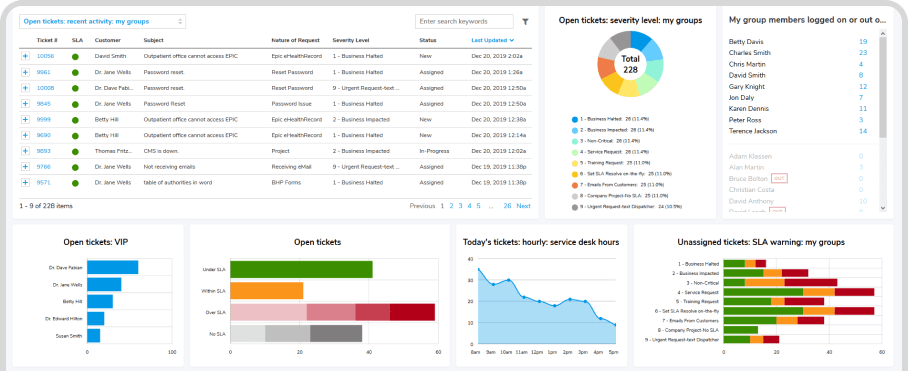The 20 Best IT Help Desk Software Solutions for 2026 - Buyer's Guide
The 2026 Buyer's Guide by Giva, a veteran in IT Help Desk cloud software since 1999, provides a comprehensive overview of the top IT Help Desk solutions, including key factors to consider like price, vendor pros and cons, and independent customer reviews. The guide also offers a free vendor analysis and scorecard tool, how to choose the right IT Help Desk software and highlights the top 15 must-have features.
Giva, founded in 1999, has become an authority in IT Help Desk software through extensive direct customer interaction and a deep understanding of the IT Help Desk landscape, which includes developing our own software. Giva's expertise also stems from managing millions of service requests, knowledge articles, and assets, enabling us to grasp the complex and diverse needs of the IT Help Desk sector, making Giva a respected and authoritative voice in the IT Help Desk industry.
Vendor Comparison Matrix for the Top IT Help Desk Software Solutions
This is a table of the vendors we evaluated with their ratings for various categories such as ease of use and value for the money, plus security reports, and locations of departments such as R&D and support.
| Vendor | Giva | Zendesk for Employee Service | Freshdesk | Jira Service Management | SolarWinds Web Help Desk | ManageEngine ServiceDesk Plus | ConnectWise PSA | SysAid | HappyFox | BMC Track-It! | Kaseya VSA | Spiceworks Cloud Help Desk | InvGate Service Desk | Atera Networks Ltd. | Naverisk | Kayako One Helpdesk | Mint Service Desk | Vision Helpdesk | NinjaOne Service Desk | SuperOps |
| Overall Rating* | 4.9 | 4.4 | 4.5 | 4.5 | 4.1 | 4.4 | 4.1 | 4.5 | 4.6 | 4 | 4 | 4.3 | 4.6 | 4.6 | 4.8 | 4 | 4.8 | 4.6 | 4.7 | 4.6 |
| Ease of Use* | 4.9 | 4.3 | 4.5 | 4.2 | 4.1 | 4.3 | 3.7 | 4.5 | 4.4 | 4.1 | 3.6 | 4.3 | 4.7 | 4.6 | 4.6 | 3.9 | 4.9 | 4.5 | 4.7 | 4.6 |
| Customer Support* | 4.9 | 4.3 | 4.5 | 4.3 | 4.1 | 4.2 | 3.7 | 4.5 | 4.6 | 4.1 | 3.6 | 4.2 | 4.6 | 4.5 | 4.8 | 3.9 | 4.8 | 4.6 | 4.7 | 4.4 |
| Value for Money* | 4.8 | 4.2 | 4.4 | 4.3 | 4.1 | 4.3 | 3.7 | 4.5 | 4.5 | 3.9 | 3.7 | 4.6 | 4.5 | 4.6 | 4.8 | 3.8 | 4.8 | 4.4 | 4.6 | 4.8 |
| Functionality* | 4.5 | 4.4 | 4.3 | 4.5 | 3.9 | 4.4 | 4.1 | 4.5 | 4.4 | 3.9 | 4.1 | 4.2 | 4.5 | 4.3 | 4.6 | 3.8 | 4.7 | 4.6 | 4.5 | 4.4 |
| Security vulnerabilities & breaches reported by US Government as of October 2025 | None | 10 Security Events | 7 Security Events | 20 Security Events | 20 Security Events | 73 Security Events | 31 Security Events | 43 Security Events | None | 11 Security Events | 35 Security Events | 9 Security Events | None | 3 Security Events | None | 26 Security Events | None | 1 Security Event | None | None |
| Will Sign BAA? | Yes, & will also sign your BAA | Yes | Yes | Yes | No | Yes | Yes | Yes | Yes | No | Yes | No | No | Yes | No | No | No | No | Yes | Yes |
| Requires Special HIPAA Configuration Work? | No | Yes | Yes | Yes | N/A | Yes | Yes | Yes | Yes | Yes | Yes | N/A | N/A | Yes | N/A | N/A | N/A | N/A | Yes | Yes |
| Higher-Cost Tiers Required for HIPAA? | No | Yes | Yes | No | N/A | No | No pricing | No | Yes | N/A | No pricing | N/A | N/A | Yes | N/A | N/A | N/A | N/A | May require | No |
| Offers Cyber-Liability Insurance at No Cost? | Yes | No | No | No | No | No | Yes | No | No | No | 3rd party at additional cost | No | No | No | No | No | No | No | No | No |
| Location of R&D | USA | Majority based in Europe and Asia | India | Majority India | USA & Europe | Majority India | Majority based in India | Israel | Primarily in India and USA | Majority outside USA | Majority based in India | India | Argentina | Israel | New Zealand | India & Singapore | Poland | India | USA & Europe | India |
| Location of Customer Support | USA | Majority outside of USA | India | Majority India | USA & Europe | Majority India | Majority based in India | Israel | Primarily in India and USA | Majority outside USA | Majority outside of USA | India | Argentina | Israel | New Zealand | India & Singapore | Poland | India | USA & Europe | Worldwide |
| Location of Company Headquarters | USA | USA | India | Australia | USA | India | USA | Israel | USA | USA | USA | USA | Argentina | Israel | New Zealand | United Kingdom | Poland | India | USA | India |
*Scale From 1 to 5 & Source Software Advice
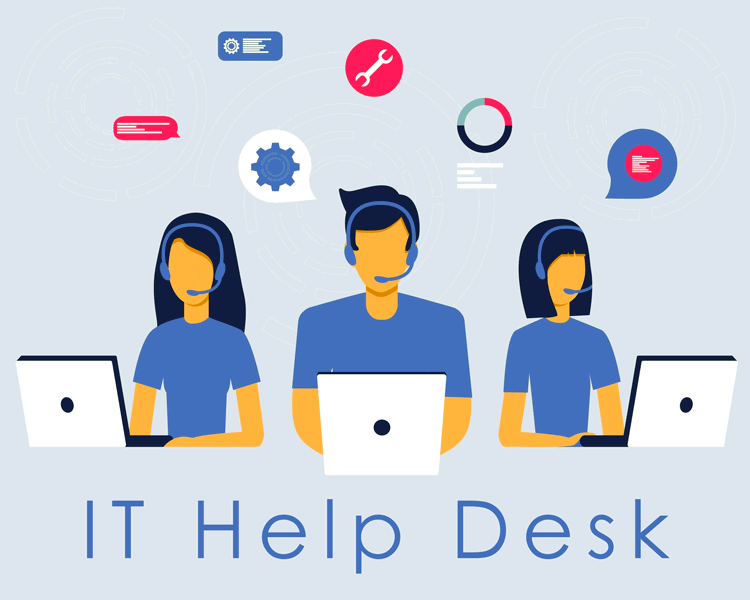
The Best Software for an IT Help Desk Support Team
-
Giva
Giva is known for its very user-friendly and minimalist design, robust automation and customization, excellent reporting, outstanding customer service, and Artificial Intelligence (AI) enabled cloud software. It has a strong focus on healthcare and other high-security-minded customers.
-
Zendesk for Employee Service
A modern solution for organizations seeking efficient IT service management and internal employee support. Originally built upon Zendesk's customer service foundation, this offering has evolved into a distinct platform tailored for internal teams such as IT, HR, and Facilities.
-
Freshdesk
This solution is a cloud-based help desk platform from Freshworks that combines omnichannel support, automation, and scalability.
-
Jira Service Management
This solution is a flexible ITSM platform built on the Atlassian ecosystem that excels in integration and customization.
-
SolarWinds Web Help Desk
It is an on-premises IT help desk solution offering solid ticketing and asset management features.
-
ManageEngine ServiceDesk Plus
This a feature-rich ITSM platform from Zoho Corporation offering deep functionality and customization.
-
ConnectWise PSA
This is a comprehensive solution designed to unify and optimize a range of business processes. Its strengths, such as extensive integration and scalability, make it an attractive option for many organizations.
-
SysAid
It can meet the needs of small and medium sized businesses and offers features from automation to customer self-service portals.
-
HappyFox
This is a cloud-based help desk platform that unifies multichannel support, automation, and self-service in a clean, easy-to-use interface for growing teams.
-
BMC Track-It!
This is part of BMC Software's portfolio and offers an all-in-one IT help desk solution, targeted at small to medium-sized businesses that want to streamline their IT processes.
-
Kaseya VSA
The primary target is Managed Service Providers (MSPs). It combines remote monitoring and management (RMM) with an array of other IT applications offering an end-to-end solution.
-
Spiceworks Cloud Help Desk
It's a free and community driven IT help desk solution that is popular among small to medium-sized businesses looking for straightforward tools at no cost and are open to relying on peer advice for support.
-
InvGate Service Management
It is a modern ITSM and ESM platform combining visual workflows, gamification, AI-powered automation, and cross-department service management capabilities.
-
Atera Networks Ltd.
It combines RMM, PSA, and remote access in an intuitive, all-in-one platform specifically designed for Managed Service Providers (MSPs) and IT teams, with growing emphasis on AI-driven automation ("Autonomous IT").
-
Naverisk
It is an integrated, mid-tier RMM + PSA platform that offers solid automation and reporting for small to mid MSPs,
-
Kayako One Helpdesk
It is a cloud-based help desk platform offering a unified multichannel customer view for small to midsize teams.
-
Mint Service Desk
A flexible and affordable IT help desk and asset management platform, offering strong configurability and deployment options but limited integrations and polish compared to leading help desk tools.
-
Vision Helpdesk
It is an affordable, help desk platform offering strong multi-brand support and automation.
-
NinjaOne Enterprise IT Helpdesk
It is a modern, cloud-based IT help desk solution built specifically for IT teams and Managed Service Providers (MSPs).
-
SuperOps
Another modern, cloud-native IT help desk and PSA platform built for Managed Service Providers (MSPs) and internal IT teams.
Giva
Giva provides an impressive and highly functional IT Help Desk solution, designed with a primary focus on enhancing IT service delivery processes within organizations. Its cloud-based application has the most advanced Artificial Intelligence (AI) capability and a broad set of features that contribute to its very high popularity among healthcare, financial, law, higher education, and other high security minded organizations.
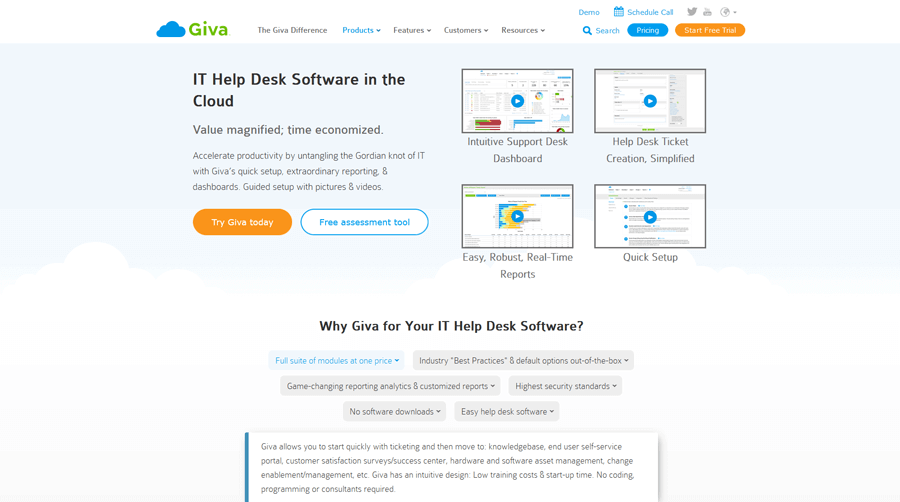
Giva Pros
- Simplified User Interface: One of the hallmarks of Giva's platform is its remarkably user-friendly design. Giva is widely appreciated for its intuitive, aesthetically pleasing, and ease-of-navigation. This significantly reduces the learning curve and encourages faster and wider adoption among team members. Giva has been cleverly designed with a minimalist, clean look that aids in effortless navigation and usage, resulting in increased productivity and operational efficiency. Giva can be deployed in just days.
- Comprehensive Feature Set: Embedded with the most advanced Artificial Intelligence (AI) capability, Giva can be configured for a traditional internal IT help desk application, external customer service/support or as an ITIL compliant ITSM solution offering a full suite of exceptional features encompassing service desk management, service level management, incident management, problem management, change enablement/management, knowledge management, configuration management (CMDB), continual improvement and service catalog.
- Exceptional Customizability: Giva's HIPAA compliant IT help desk software is highly customizable without programming or consultants and users can fine-tune the interface and dashboards to match individual preferences and specific business requirements. This degree of customization boosts usability and ensures seamless alignment with an organization's unique workflows.
- Advanced Reporting: Giva has excellent reporting and analytics capabilities, making it a standout among all competitors. Users can create, save, share and schedule an extensive array of customizable reports, facilitating the tracking of KPIs, real-time analytics, and other performance metrics — an essential attribute for strategic IT planning and informed decision-making.
- Stellar Customer Support: Giva is known for its exceptional customer service. Users often praise the support team's responsiveness and ability to quickly answer "How To" questions and resolve any technical issues. The support team's ability to swiftly respond to and resolve user queries has been lauded by many customers, enhancing overall user satisfaction.
- Security and Compliance: Prioritizing data security, Giva's platform is HIPAA, HITECH and GDPR compliant, establishing it as a reliable choice for healthcare organizations and other businesses with strict data protection requirements. Giva takes data security seriously. To protect sensitive customer data, Giva employs robust security measures, including encryption at rest, intrusion detection systems, specialized hardware-based firewalls, and SSAE 18 SCO 2 Type 2 compliance audits. Due to today's high threat cybersecurity and risk environment, all Giva customers receive full HIPAA, HITECH and GDPR compliance and Giva will sign a business associated agreement (BAA) as a standard feature at no additional cost.
- Continuous Improvement & Innovation: Giva's IT help desk software demonstrates a clear commitment to continuous improvement and innovation, consistently updating and enhancing its platform using Agile Software development to ensure it meets evolving customer needs. New releases are launched approximately every three weeks. Its dedicated approach to customer satisfaction and unwavering commitment to quality helps many organizations stay ahead in the modern digital landscape.
Giva Cons
- Limited Awareness: Giva has less general market awareness and brand recognition as compared to other brands that enjoy more visibility. This could be due to various factors, such as limited marketing efforts, a niche healthcare and high security target audience, or competition from much larger players in the industry such as ServiceNow, BMC, Freshservice, Atlassian Jira, and ManageEngine.
- Cost: Giva's pricing can be on the higher side compared to other less functional IT help desk solutions on the market. Giva is priced competitively with other comparably functional solutions. The wealth of features, high security, top-notch support, and superior customizability justify the investment, particularly for organizations that prioritize efficient, reliable IT service management.
- Lack of Multilingual Support: As of today, Giva primarily supports an English-speaking customer base. However, all customization menus can be localized in different languages (e.g. German, Spanish, etc.) This could be a limitation for organizations operating in non-English speaking regions or with multilingual teams.
- Integration: Giva's cloud software integrates well with other Giva products, as well as providing a wide variety of REST APIs that can be used to integrate with any third-party apps. However, due to Giva's HIPAA compliance and focus on high security/compliance, Giva lacks an ecosystem of integrations like some vendors offer.
Overall, Giva's HIPAA compliant IT helpdesk software and other solutions offer numerous benefits, including robust security, a user-friendly design, comprehensive features, customization options, advanced reporting, and exceptional customer support.
Other Giva Company and Location Information
- Company Ownership: Private company founded in 1999.
- Headquarters: USA
- R&D & Technical Support: USA
Pricing, Videos, Trial and Reviews Information for Giva
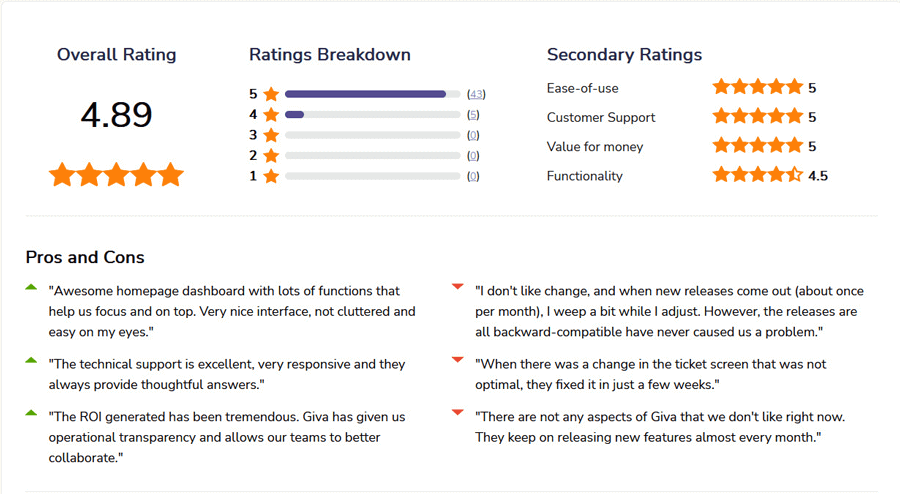
Independent Ratings and Reviews for Giva from Software Advice
Zendesk for Employee Service
Zendesk for Employee Service, with its user-centric design and robust integration capabilities, offers a modern solution for organizations seeking efficient IT service management and internal employee support. Originally built upon Zendesk's customer service foundation, this offering has evolved into a distinct platform tailored for internal teams such as IT, HR, and Facilities.
In 2025, Zendesk introduced the Employee Service Suite, expanding the platform with a Service Catalog, Tasks & Approvals, and AI-powered Copilot tools designed to unify service management across departments. These enhancements mark Zendesk's growing investment in workflow intelligence, automation, and the overall employee experience.
However, potential customers should still weigh considerations like high pricing, limited customization depth, and data migration complexity against their specific organizational needs. Also, there have been multiple recent cybersecurity vulnerabilities reported by the United States government.
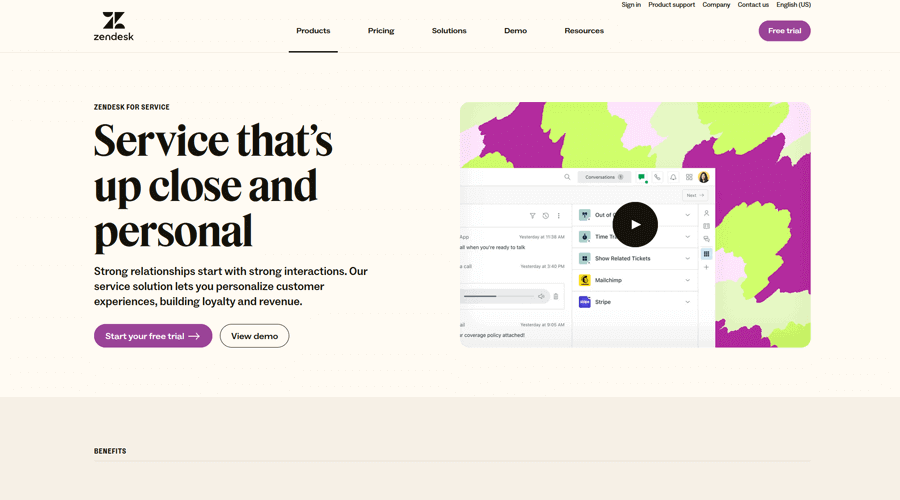
Zendesk for Employee Service Pros
- Intuitive Interface: Clean, user-friendly design that allows employees and agents to navigate and manage requests with ease.
- AI-Powered Automation: Zendesk's Copilot and AI Agents assist with ticket triage, task routing, and resolution suggestions to reduce manual workload.
- Service Catalog & Approvals: Built-in catalogs and approval workflows streamline internal requests such as onboarding, access control, and hardware orders.
- Omni-Channel Support: Unified communication across chat, email, and self-service portals ensures consistent employee support experiences.
- Strong Integrations: Seamless integration with Microsoft Teams, Slack, Google Workspace, and Okta enables collaboration within existing work tools.
- Scalability: Designed to scale smoothly across departments and growing ticket volumes without loss of performance.
- Advanced Reporting: Comprehensive analytics provide insights into SLAs, resolution times, and employee satisfaction.
Zendesk for Employee Service Cons
- Pricing Model: As organizations expand or require advanced AI features, costs can become substantial. License flexibility remains limited for mixed departmental use.
- Customization Restrictions: Deeper process customization and advanced form logic often require development effort or third-party extensions.
- Initial Learning Curve: The addition of new modules like Catalog and Approvals can extend onboarding time for administrators and agents.
- Data Migration Challenges: Transitioning from legacy ITSM systems can involve complex data mapping and loss of historical context.
- Performance Inconsistencies: Some users report system lag during peak usage periods.
- No On-Premises Option: Zendesk remains fully cloud-based, which may not suit organizations with on-prem or strict data residency requirements.
Other Zendesk for Employee Service Company and Location Information
- Company Ownership: Private equity firms, Hellman & Friedman and Permira, acquired Zendesk in November 2022. It was previously a public company. Private equity buyouts of public companies can lead to significant job losses and restructuring, often with a focus on short-term profits at the expense of long-term growth and stability. Typically, research and development and customer service are substantially reduced to increase profitability. The acquired companies may face increased debt levels, resulting in financial stress and reduced ability to invest in opportunities.
- Headquarters: USA
- R&D: Majority based in Europe and Asia
- Technical Support: Majority outside of USA
Pricing, Videos, Trial and Reviews Information for Zendesk for Employee Service
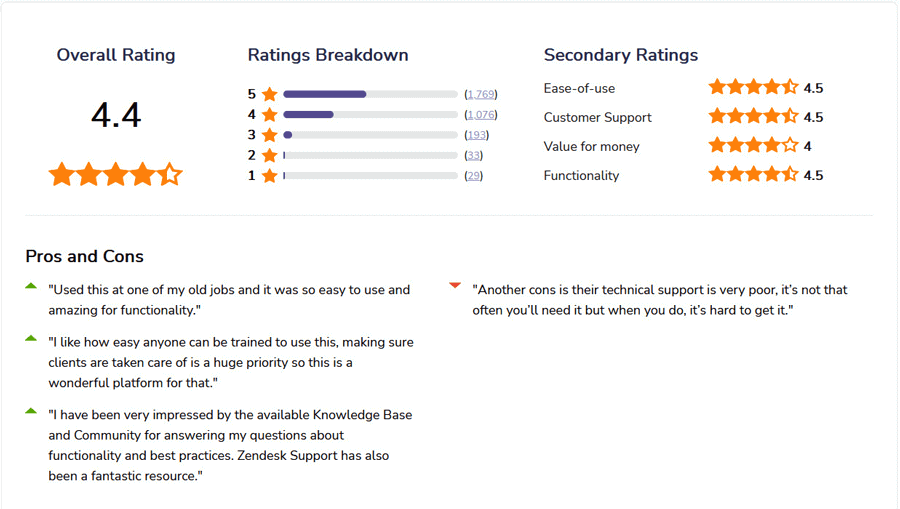
Independent Ratings and Reviews for Zendesk for Employee Service from Software Advice
Freshdesk
Freshdesk, part of Freshworks Inc., is a widely used cloud-based help desk and customer support platform. It is often praised for its user-friendly interface, omnichannel support, and automation capabilities. However, potential adopters should carefully weigh several drawbacks, including high costs at scale, integration limitations, and multiple security vulnerabilities disclosed by the U.S. government in recent years. Freshdesk's technical support has also been consistently rated below average, largely due to offshore support operations based in India. Also, there have been multiple recent cybersecurity vulnerabilities reported by the United States government.
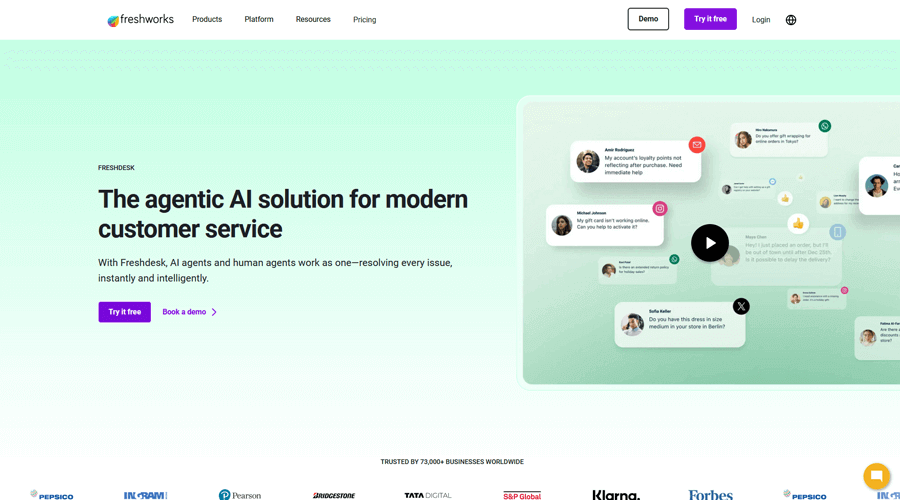
Freshdesk Pros
- User-Friendly Interface: Freshdesk provides an intuitive, modern design that enables quick onboarding for agents and administrators alike. The interface is optimized for usability, even for non-technical users.
- Omnichannel Support: The platform consolidates communication across email, chat, social media, and phone into a single interface, helping teams manage customer interactions efficiently.
- Automation and AI Features: Freshdesk includes workflow automations and AI-driven tools like ticket categorization and prioritization, reducing repetitive work and improving response consistency.
- Cloud-Based and Accessible: Being cloud-native, Freshdesk can be accessed from anywhere and requires minimal infrastructure setup or maintenance.
- Scalability: Suitable for startups through mid-sized enterprises, Freshdesk allows teams to expand functionality through paid plans and add-ons as their support operations grow.
- Knowledge Base Integration: A built-in knowledge base helps reduce ticket volume by empowering end users with self-service options.
- SLA and Time Tracking: Built-in SLA management and reporting allow teams to monitor response and resolution times to maintain accountability.
Freshdesk Cons
- Pricing and Hidden Costs: While Freshdesk starts with competitive entry-level pricing, costs can escalate significantly as organizations add features, channels, or advanced automation.
- Integration Complexity: Although it integrates with many third-party apps, setup and data synchronization can be difficult, especially for larger environments or when using legacy tools.
- Performance and Reliability Issues: Users frequently report slowness when handling large ticket volumes or complex reports, particularly during peak load periods.
- Limited Customization: Certain aspects, like dashboards, analytics, and workflows, offer limited flexibility compared to more enterprise-grade platforms.
- Reporting Constraints: Freshdesk's analytics tools lack depth and customization, making it difficult for enterprise teams to build detailed performance or trend reports.
- Technical Support Concerns: The majority of technical and product support is based in India (Bangalore and Chennai), and user feedback commonly cites long response times and limited escalation options.
- Cybersecurity Vulnerabilities: The U.S. Cybersecurity and Infrastructure Security Agency (CISA) has listed multiple vulnerabilities involving Freshdesk/Freshworks products in recent years, requiring prompt patching to mitigate risks.
Other Freshdesk Company and Location Information
- Company Ownership: Freshworks, Inc. (NASDAQ: FRSH).
- Headquarters: San Mateo, California, USA
- R&D and Technical Support: 88% of all employees are located in Bangalore and Chennai, India.
Pricing, Videos, Trial and Reviews Information for Freshdesk
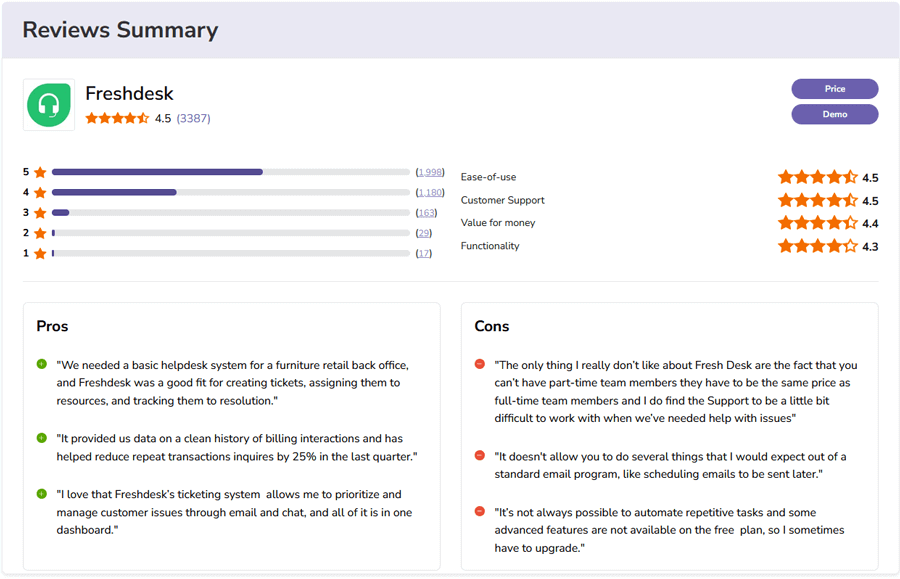
Independent Ratings and Reviews for Freshdesk from Software Advice
Jira Service Management
Jira Service Management, developed by Atlassian, is one of the most popular ITSM platforms globally. It's valued for its flexibility, rich integration ecosystem, and alignment with DevOps workflows. The platform is highly customizable, allowing teams to adapt it to nearly any process, but this same flexibility often introduces configuration complexity, performance slowdowns, and hidden administrative overhead.
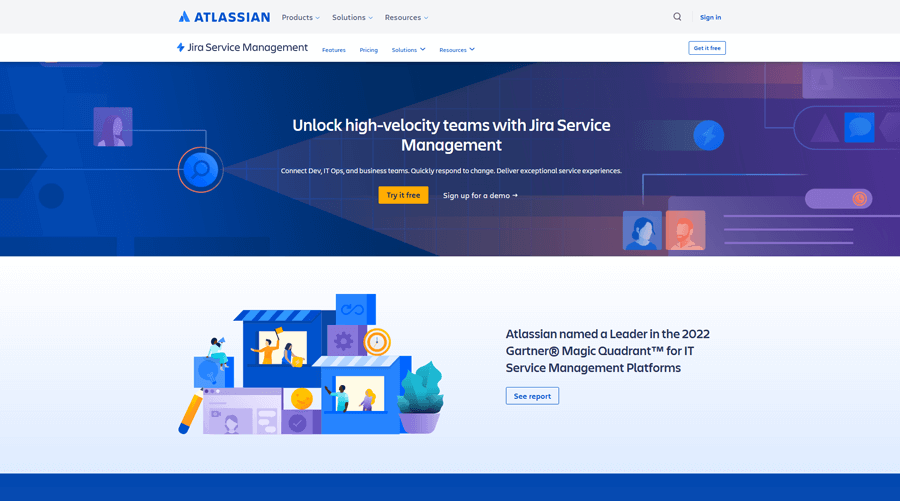
Jira Service Management Pros
- Integrated Atlassian Ecosystem: Jira Service Management integrates seamlessly with other Atlassian products such as Jira Software, Confluence, and Bitbucket, enabling strong collaboration between IT, development, and business teams.
- Highly Customizable Workflows: Organizations can tailor request types, approval chains, and escalation paths to fit unique processes and compliance requirements.
- Scalability and Extensibility: JSM can scale from small IT teams to enterprise-level deployments with thousands of users, supported by the Atlassian Marketplace's extensive library of add-ons and integrations.
- Robust Reporting and Analytics: Built-in dashboards, SLA tracking, and customizable reports help IT leaders measure efficiency, agent productivity, and service performance.
- SLA and Automation Features: The platform includes native SLA management, automated triggers, and escalation rules to ensure service quality and compliance.
- Strong Collaboration Capabilities: Integrated with Confluence for documentation and Slack or Microsoft Teams for communication, JSM fosters real-time collaboration on incidents and service requests.
- ITIL Certification: Jira Service Management is ITIL 4 certified for multiple core practices, including incident, problem, and change management.
Jira Service Management Cons
- Complex Setup and Administration: The platform's flexibility often results in complexity. Configuration, workflow design, and plugin management can be time-consuming, especially for teams without dedicated Jira administrators.
- Performance Degradation at Scale: Many users report slow performance in large instances or when handling large ticket volumes, complex automations, or numerous custom fields.
- High Total Cost of Ownership (TCO): While base pricing is competitive, costs can escalate significantly as organizations add Marketplace apps, advanced analytics, or premium hosting tiers (Data Center or Enterprise Cloud).
- Integration Challenges with Non-Atlassian Tools: While integrations within Atlassian's suite are seamless, connecting to non-Atlassian systems can require third-party middleware or custom development.
- Steep Learning Curve: Non-technical teams often struggle with Jira's interface and configuration options, which can hinder adoption and increase training costs.
- Mobile App Limitations: The mobile experience, though improving, lacks some of the functionality and customization options of the desktop version.
- Support Responsiveness: Technical support is primarily managed from India and Australia. Users report that response times and issue resolution can vary depending on subscription tier and region.
Other Jira Service Management Company and Location Information
- Company Ownership: Public company, Atlassian Corporation (NASDAQ: TEAM)
- Headquarters: Sydney, Australia
- R&D and Technical Support: Primarily in Bengaluru (India), Sydney (Australia), and Austin (Texas, USA)
Pricing, Videos, Trial and Reviews Information for Jira Service Management
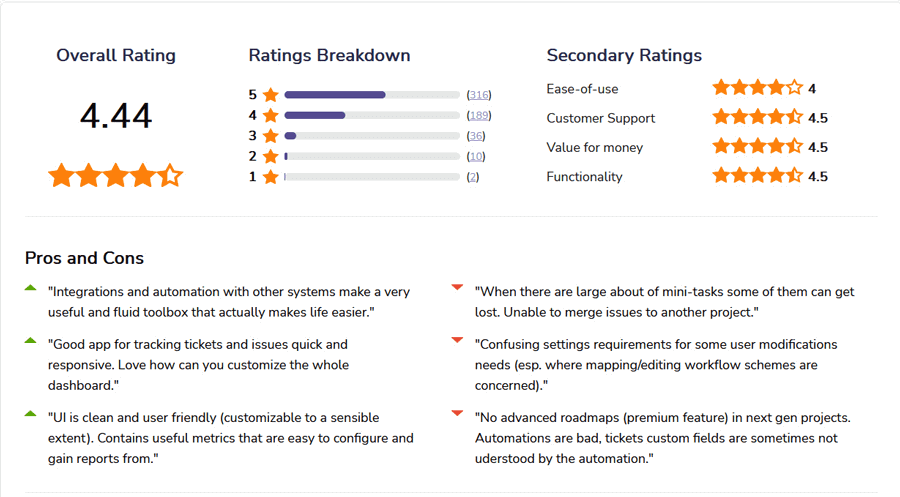
Independent Ratings and Reviews for Jira Service Management from Software Advice
SolarWinds Web Help Desk
SolarWinds Web Help Desk is an on-premises and hybrid IT help desk solution designed for organizations seeking traditional ticketing, SLA management, and asset tracking capabilities. It remains popular in certain sectors requiring on-prem deployment but has declined in relevance due to limited modernization, integration challenges, and continued security scrutiny following multiple vulnerabilities reported by the U.S. government and SolarWinds' 2020 supply chain breach that impacted roughly 18,000 customers worldwide.
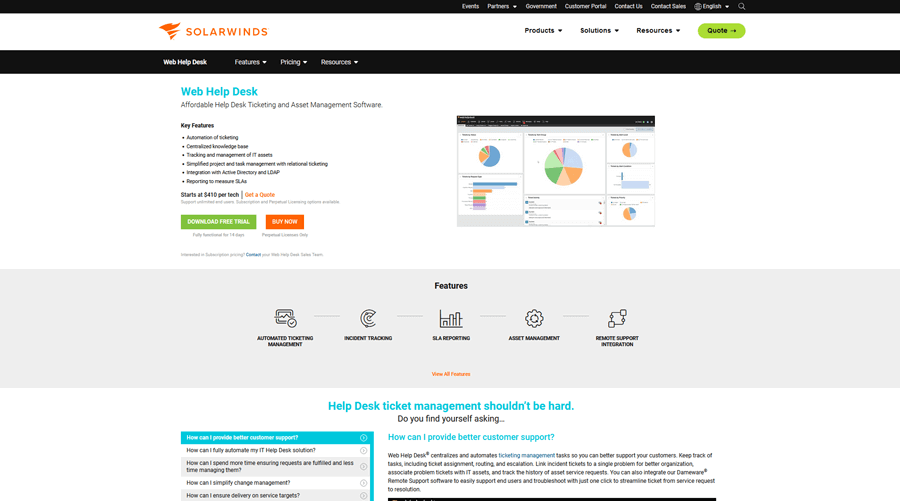
SolarWinds Web Help Desk Pros
- Straightforward Ticketing System: Provides structured ticket creation, tracking, and routing workflows for managing internal IT requests.
- SLA and Time Tracking: Built-in SLA management tools help ensure response and resolution compliance across service categories.
- Automation of Routine Tasks: WHD can automate repetitive service desk processes such as ticket assignment, notifications, and escalations.
- Knowledge Base and Self-Service Portal: A centralized repository allows users to find solutions quickly and reduce ticket submissions.
- Asset Management Integration: Includes asset discovery and tracking, giving IT teams insight into the organization's hardware and software inventory.
- Customizable Interface and Forms: Administrators can adapt forms, fields, and categories to align with internal IT policies or workflows.
- On-Premises Deployment Option: Appeals to organizations that require data to remain within local infrastructure for compliance or control reasons.
SolarWinds Web Help Desk Cons
- Aging Platform and UI: WHD's interface and functionality have seen minimal modernization over the past several years, lagging behind cloud-based competitors.
- Performance Issues: Users frequently report slow page loads and database performance problems, particularly as ticket volume grows.
- Limited Integrations: Integration beyond the SolarWinds ecosystem (e.g., with modern collaboration or CRM tools) is restricted and often requires custom API work.
- Complex Setup and Maintenance: Initial installation and ongoing upkeep can be time-consuming, particularly for organizations without dedicated IT administrators.
- Mobile Accessibility Limitations: Mobile access is basic and lacks full parity with desktop capabilities.
- Licensing and Maintenance Costs: As environments expand, annual maintenance and additional technician licenses can significantly increase total ownership cost.
- Security Concerns: Multiple SolarWinds vulnerabilities, including those disclosed by the U.S. Cybersecurity and Infrastructure Security Agency (CISA), continue to impact organizational trust and require careful patch management.
Other SolarWinds Web Help Desk Company and Location Information
- Company Ownership: SolarWinds Corporation (NYSE: SWI): Originally privatized by Silver Lake Partners and Thoma Bravo in 2016 for $4.5 billion, re-listed in 2018 IPO with both firms retaining significant stakes.
- Headquarters: USA
- R&D and Technical Support: USA and Europe
Pricing, Videos, Trial and Reviews Information for SolarWinds Web Help Desk
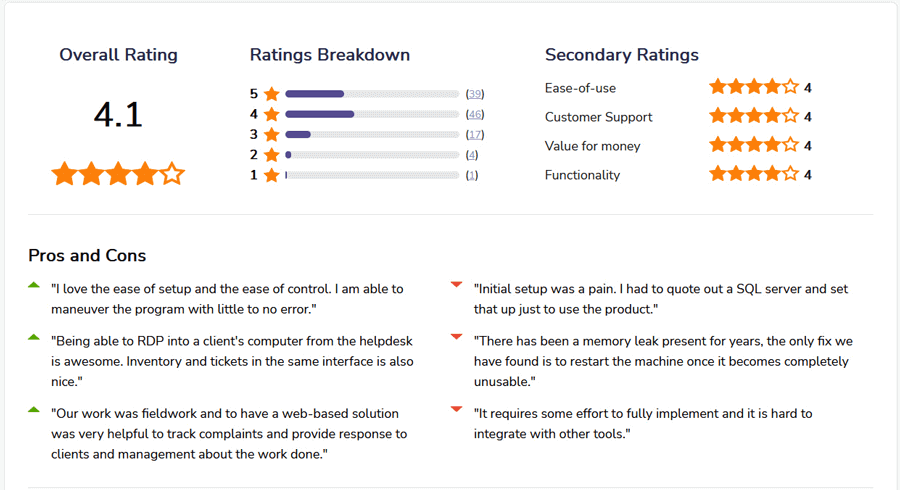
Independent Ratings and Reviews for SolarWinds Web Help Desk from Software Advice
ManageEngine ServiceDesk Plus
ManageEngine ServiceDesk Plus, developed by Zoho Corporation, is a widely used IT service management (ITSM) and help desk solution known for its rich feature set and flexibility. The platform offers an extensive range of ITIL-aligned capabilities, from ticketing and asset management to change, problem, and project management. However, its complexity, performance lags, and aging interface continue to draw consistent criticism from users, along with multiple cybersecurity vulnerabilities reported by the U.S. government in recent years that have impacted ManageEngine products.
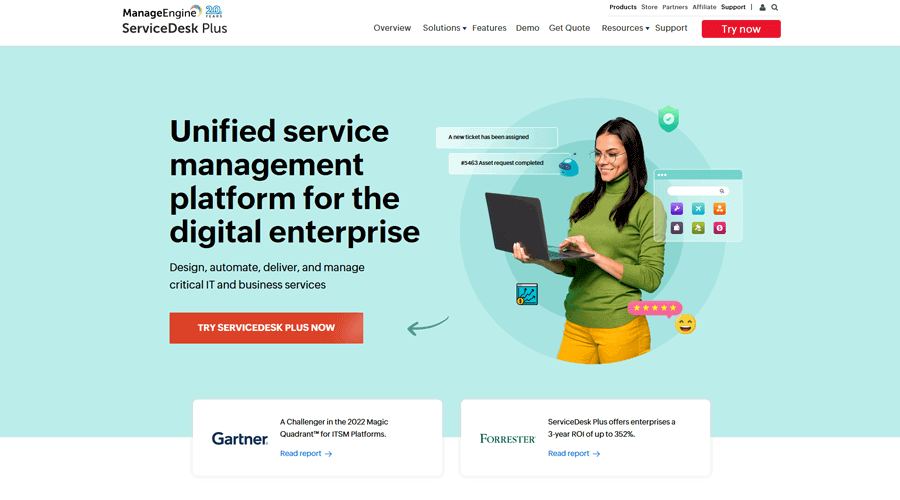
ManageEngine ServiceDesk Plus Pros
- Comprehensive ITSM Capabilities: ServiceDesk Plus provides full ITSM functionality, including incident, problem, change, release, and asset management, making it suitable for medium and large enterprises seeking an all-in-one tool.
- Automation and Workflow Customization: The platform allows detailed automation of approvals, escalations, and notifications to minimize manual intervention and improve response consistency.
- Multichannel Ticketing: End users can raise tickets via email, web portal, chat, or phone, helping IT teams manage requests across multiple channels.
- Integrated Asset Management: Native asset discovery and lifecycle management tools give IT departments better visibility into hardware and software resources.
- Reporting and Dashboards: ServiceDesk Plus includes customizable dashboards and pre-built reports to track SLA compliance, ticket trends, and agent productivity.
- Scalability and Deployment Flexibility: Available as both on-premises and cloud editions, the platform can scale with growing organizations and adapt to differing compliance or data residency needs.
ManageEngine ServiceDesk Plus Cons
- Complex Setup and Administration: The platform's extensive features can make deployment and configuration challenging, often requiring specialized knowledge or paid professional services.
- Steep Learning Curve: New users, particularly those without prior ITSM experience, may find it difficult to navigate and fully leverage the tool's capabilities.
- Performance Issues: Users frequently report slow load times, especially when managing large ticket volumes or running complex reports.
- Outdated Interface: The UI design is functional but dated, making it less intuitive compared to more modern cloud-native competitors.
- Integration Limitations: Integration with non-Zoho or third-party applications can be cumbersome and often requires custom scripting or middleware.
- Pricing Transparency: The licensing structure can be confusing, with separate pricing for modules, assets, and technicians, leading to higher costs at scale.
- Cybersecurity Vulnerabilities: Several critical ManageEngine products, including ServiceDesk Plus, have been listed in multiple CISA advisories for exploitable vulnerabilities between 2021 and 2024, requiring timely patching to ensure security.
- Support Delays: Technical support, primarily based in India, has received mixed reviews for response time and escalation handling.
Other ManageEngine ServiceDesk Plus Company and Location Information
- Company Ownership: Private owned by ZOHO Corp.
- Headquarters: India
- R&D and Technical Support: Renigunta and Tenkasi, India.
- Datacenters: Mumbai and Chennai, India
Pricing, Videos, Trial and Reviews Information for ManageEngine ServiceDesk Plus
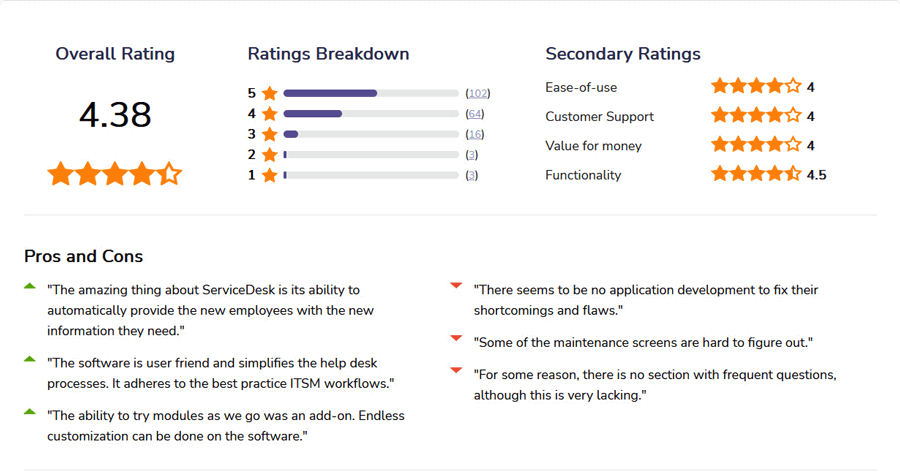
Independent Ratings and Reviews for ManageEngine ServiceDesk Plus from Software Advice
ConnectWise PSA
ConnectWise PSA is a comprehensive solution designed to unify and optimize a range of business processes. Its strengths, such as extensive integration and scalability, make it an attractive option for many organizations. However, potential adopters should consider factors like its user interface complexity and poor customer support reputation when determining its fit for their operations. Also, there have been multiple recent cybersecurity breaches and vulnerabilities reported by the United States government.
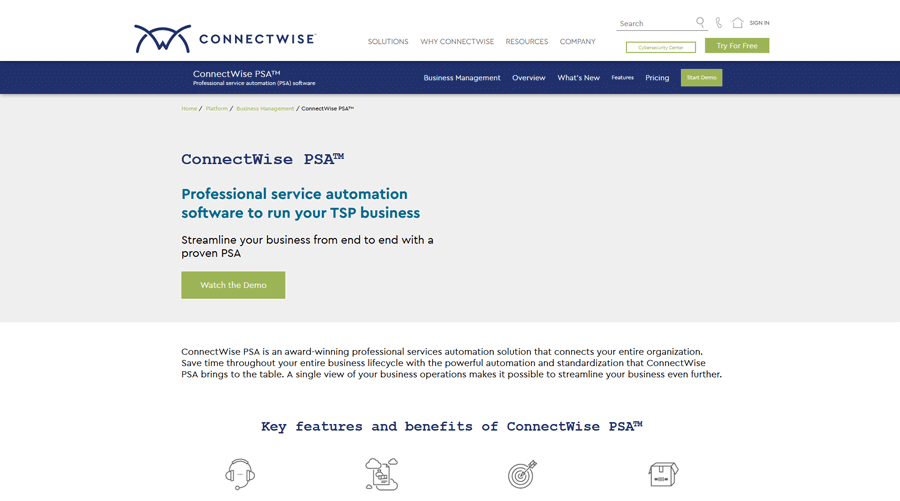
ConnectWise PSA Pros
- Unified Platform: ConnectWise PSA offers an all-in-one solution, integrating CRM, ticketing, billing, reporting, and project management, thereby streamlining multiple business operations.
- Extensive Integrations: It boasts an ecosystem of integrations with third-party applications, which allows businesses to create a cohesive technological environment tailored to their needs.
- Customizable Workflows: ConnectWise PSA can be tailored to fit specific operational processes, enhancing efficiency, and reducing manual interventions.
- Scalability: ConnectWise PSA is designed to accommodate the growth of businesses. Whether for a small team or a large organization, it scales in response to the evolving demands.
- Comprehensive Reporting: The platform offers in-depth analytics and reporting tools, enabling businesses to make data-driven decisions and continuously improve their operations.
- Security: ConnectWise PSA takes data protection seriously, providing robust security measures to ensure client data integrity and confidentiality.
ConnectWise PSA Cons
- Complex User Interface: Some users feel that ConnectWise PSA's interface is not as intuitive as it could be, leading to a steeper learning curve.
- Pricing: The costs can escalate quickly for larger teams or when additional modules and features are required.
- Performance Issues: Some users have reported occasional lags or downtime, which can interrupt regular business operations.
- Limited Mobile Experience: While it does offer a mobile version, its functionality is limited compared to the desktop version.
- Challenging Implementation: Setting up and configuring the platform, especially for more complex business processes, can be time-consuming and require specialized expertise.
- Customer Support Concerns: There have been instances where customers felt the customer technical support was not as responsive or as knowledgeable as expected.
Other ConnectWise PSA Company and Location Information
- Company Ownership: Private equity firm, Thoma Bravo, acquired ConnectWise in February 2019. Private equity buyouts can lead to significant job losses and restructuring, often with a focus on short-term profits at the expense of long-term growth and stability. Typically, research and development and customer service are substantially reduced to increase profitability. The acquired companies may face increased debt levels, resulting in financial stress and reduced ability to invest in opportunities.
- Headquarters: USA
- R&D: Majority based in India
- Technical Support: Majority based in India, but also USA & Philippines
Pricing, Videos, Trial and Reviews Information for ConnectWise PSA
- Request a quote.
- Features & Demo Videos
- Create Trial Account
- Independent Customer Reviews
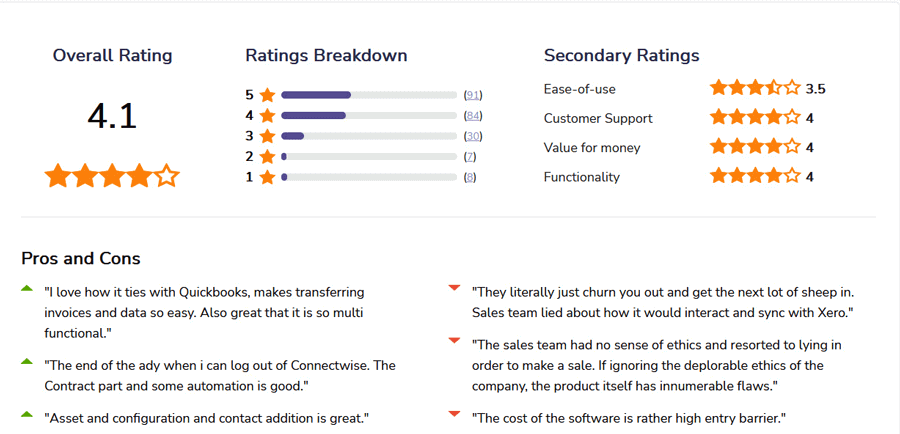
Independent Ratings and Reviews for ConnectWise PSA from Software Advice
SysAid
SysAid Help Desk emerges as a multifaceted IT service management tool with a range of features catering to diverse organizational needs. Its strengths in integration, mobile accessibility, and customization position it as a strong contender in the ITSM market. However, businesses considering SysAid should weigh its broad capabilities against factors like setup complexity, high-cost structure, and poor technical support reputation to determine its fit for their operations. Also, there have been multiple recent cybersecurity breaches and vulnerabilities reported by the United States government.
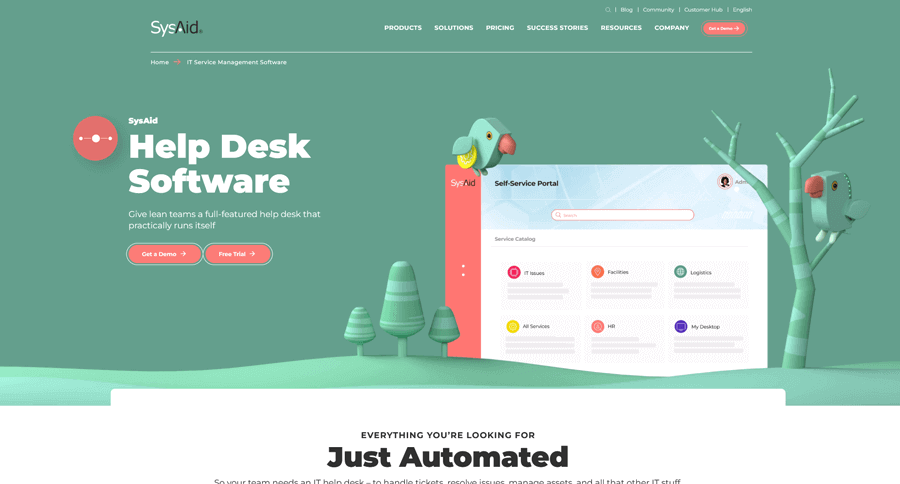
SysAid Pros
- Broad Functionality: SysAid Help Desk is not just a ticketing system. It offers an integrated set of tools including asset management, reporting, self-service portal, and automation, providing businesses with a comprehensive IT service management solution.
- User-Friendly Interface: SysAid's interface is intuitive and easy to navigate, reducing the learning curve and increasing user adoption rates.
- Customization and Integration: SysAid provides extensive customization options. Moreover, its ability to integrate with various third-party applications further enhances its flexibility.
- Mobile Application: SysAid offers a mobile app, enabling IT professionals to manage tickets and respond to issues on the go, ensuring timely resolution irrespective of their location.
- Robust Reporting: Its analytical capabilities allow organizations to track performance metrics, gauge team productivity, and make informed decisions based on real-time data.
- Cloud and On-Premises Options: SysAid is available both as a cloud-based solution and an on-premises deployment, offering organizations the choice based on their infrastructure needs and preferences.
SysAid Cons
- Initial Setup Complexity: Some users find the initial setup and configuration of SysAid to be very complex and time-consuming.
- Pricing Model: The cost, especially for the more advanced features, can be very high for small to medium-sized businesses.
- Performance Glitches: Customers have reported ongoing problems with software bugs, and application performance slowdowns have also been reported, which can hinder the smooth operation of the help desk.
- Limited Advanced Features in Basic Plans: To access some of the more advanced features, organizations often need to upgrade to higher-tiered plans.
- Learning Curve for Advanced Features: While the basic interface is user-friendly, mastering the advanced functionalities requires more in-depth training.
- Customer Support: Many customers have highlighted delays in response time or receiving generic solutions from the customer support team that did not solve their problems. The delays may be because SysAid's technical support is in Tel Aviv, Israel, and the dissatisfaction due to numerous software bugs.
Other SysAid Company and Location Information
- Company Ownership: Start-up & venture capital funded.
- Headquarters: Tel Aviv, Israel
- R&D and Technical Support: Tel Aviv, Israel
Pricing, Videos, Trial and Reviews Information for SysAid
- Pricing not available. Must speak with partner reseller or sales organization.
- Features & Demo Videos
- Create Trial Account
- Independent Customer Reviews
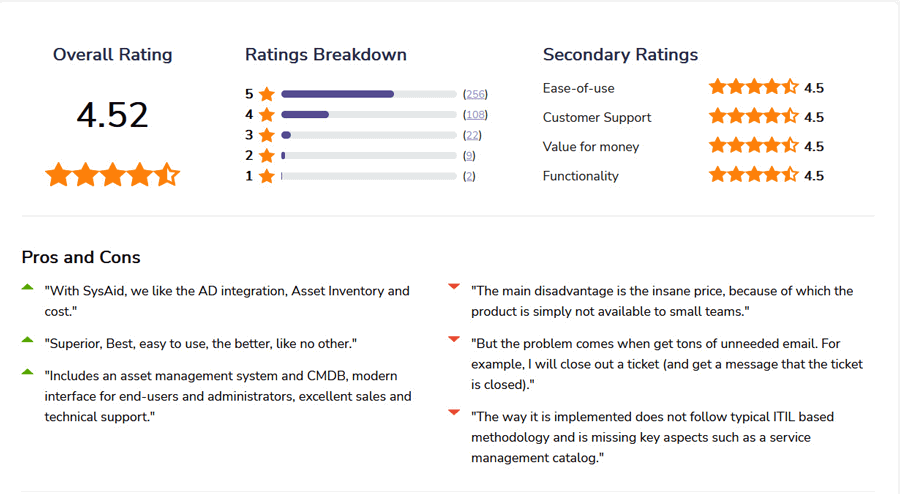
Independent Ratings and Reviews for SysAid from Software Advice
HappyFox
HappyFox is a cloud-based help desk and customer support platform designed for simplicity, automation, and efficiency. It centralizes support requests from email, web, chat, and social channels into one interface, making it well-suited for organizations seeking an easy-to-use, all-in-one ticketing system. The software is recognized for its clean UI, workflow automation, and responsive customer service but has more limited enterprise extensibility compared with larger competitors.
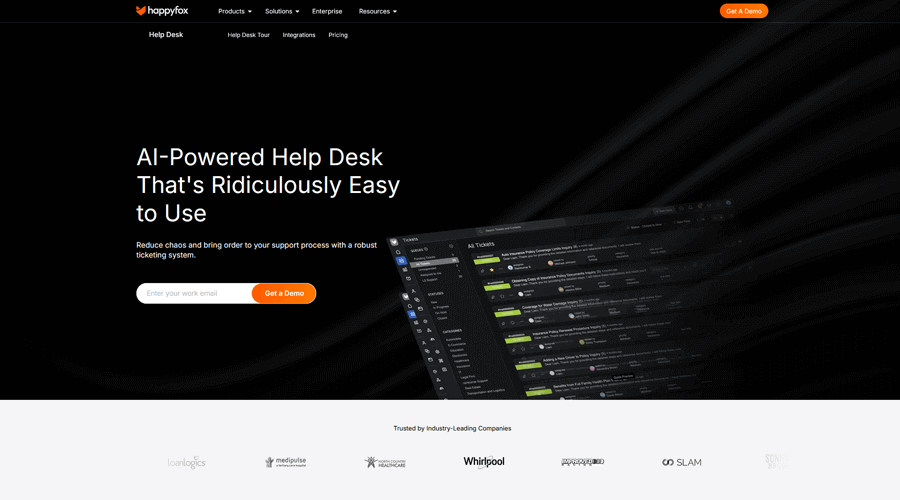
HappyFox Pros
- Clean, Intuitive Interface: HappyFox's straightforward design allows teams to get up and running quickly without extensive training.
- Omnichannel Ticket Management: Consolidates requests from multiple sources (email, chat, social, phone, web forms) into a single queue for better visibility.
- Automation and Smart Rules: Custom workflows, auto-assignment, and escalation rules help teams reduce manual work and improve response consistency.
- Robust Knowledge Base: Built-in self-service capabilities let customers find answers independently, lowering ticket volumes.
- SLA and Reporting Tools: SLA policies and analytics dashboards enable service tracking and performance measurement.
- Integrations and APIs: Offers native integrations with popular business tools like Salesforce, Microsoft Teams, Slack, and Jira, plus an open API for additional connectivity.
- Responsive Support: HappyFox's U.S.-based and distributed support teams receive positive feedback for fast, knowledgeable responses.
HappyFox Cons
- Limited Enterprise Features: Lacks some of the advanced ITSM and change-management capabilities found in larger enterprise platforms.
- Customization Constraints: Branding and workflow customization are available but not as granular as in higher-end competitors.
- Reporting Depth: While solid for general analytics, it offers fewer advanced or ad-hoc reporting options compared with tools like Zendesk or Freshdesk.
- Pricing for Growth: As organizations expand agent seats or add modules (e.g., live chat, asset management), total subscription costs can increase quickly.
- Mobile App Limitations: While functional, the mobile app provides fewer administrative and reporting options compared with the desktop version, limiting flexibility for managers on the go.
Other HappyFox Company and Location Information
- Company Ownership: Privately held.
- Headquarters: USA
- R&D and Technical Support: Primarily in India and USA
Pricing, Videos, Trial and Reviews Information for HappyFox
- Pricing
- Features & Demo Videos
- No trial available from website
- Independent Customer Reviews
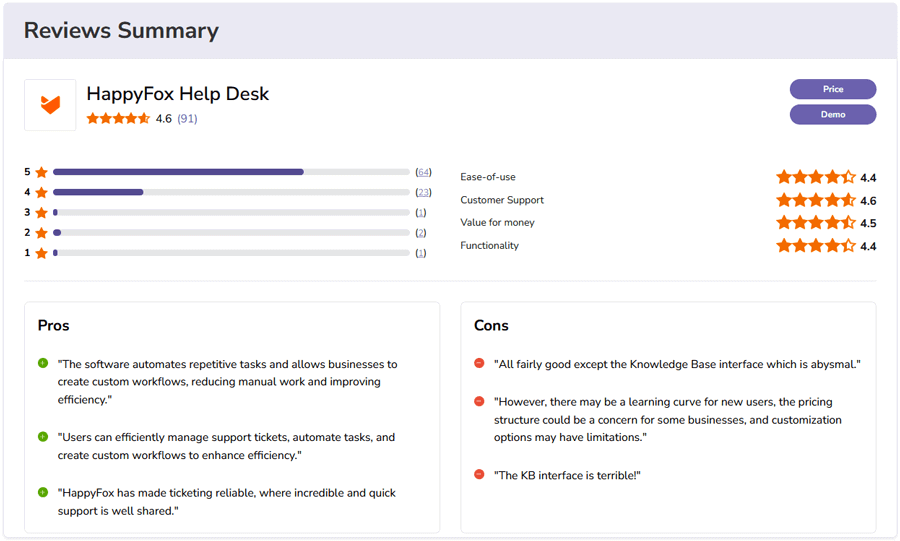
Independent Ratings and Reviews for HappyFox from Software Advice
BMC Track-It!
BMC Track-It! stands out as a well-rounded help desk solution, offering a wide range of functionalities suited for diverse IT support scenarios. While its comprehensive features and user-friendly interface are positives, potential adopters should be mindful of its limitations, particularly around customizability and performance issues stemming from unresolved software bugs.
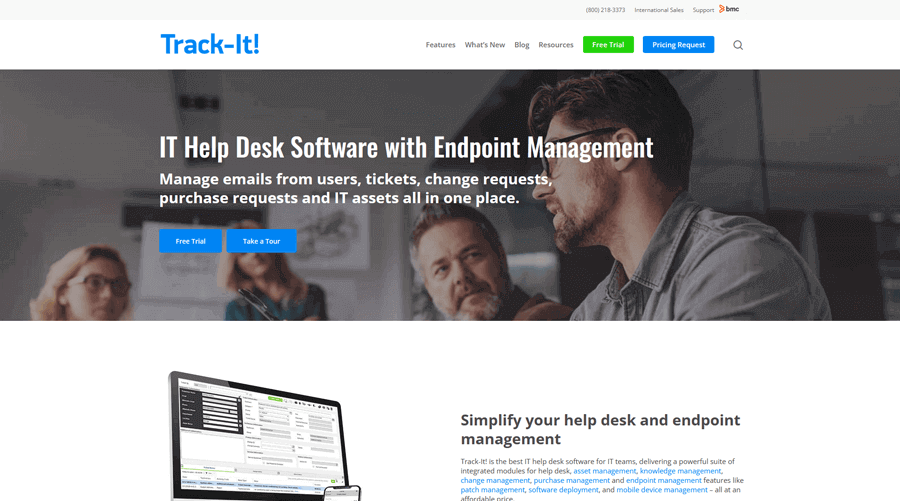
BMC Track-It! Pros
- Comprehensive Feature Set: BMC Track-It! offers a wide range of tools beyond just ticketing. This includes asset management, change management, knowledge base, and reporting functionalities, making it a one-stop solution for IT support needs.
- Ease of Deployment: Track-It! is designed with straightforward installation and setup processes. Organizations can get it up and running with minimal disruption to ongoing operations.
- User-Centric Interface: The software boasts a user-friendly dashboard, ensuring even those new to IT support tools can navigate and utilize it with ease.
- Self-Service Portal: BMC Track-It! offers a self-service portal that allows end users to log issues, track progress, and access solutions for common problems without needing to contact the IT support team.
- Configurable Workflow Automation: Routine tasks can be automated, ensuring tickets move seamlessly through predefined processes, leading to faster resolution times.
- Audit & Compliance Features: Track-It! includes tools that assist in maintaining regulatory compliance — a strong advantage for sectors where adhering to specific regulations is critical.
BMC Track-It! Cons
- Software Updates: Some users report significant glitches following software updates, which may require further patches or user adjustments. Occasionally, these issues also include security vulnerabilities.
- Limited Customizability: Compared to some competitors, the scope for customizing certain features — particularly within the user interface — can be limited.
- Training Requirements: While the basic functions are intuitive, mastering advanced features often requires formal training sessions that can be costly and dependent on professional services.
- Pricing Concerns: For smaller businesses or teams, the cost is relatively high, especially when considering the full suite of features.
- Integration Challenges: Certain third-party software integrations can be cumbersome or not as seamless as desired.
- Performance Issues: Ongoing software performance lags — especially when the database is over two years old — have been reported by many customers.
Other BMC Track-It! Company and Location Information
- Company Ownership: KKR & Co., a private equity firm, purchased BMC Software in 2018 for $8.3 billion, with plans to cut costs, increase profitability, and eventually take BMC public again to generate returns for its investors.
- Headquarters: USA
- R&D and Technical Support: Distributed primarily outside the USA in low-cost labor markets such as India, with a small technical support presence in Houston, Texas.
Pricing, Videos, Trial and Reviews Information for BMC Track-It!
- Pricing not available. Must speak with a partner reseller or sales person.
- Features & Demo Videos
- Create Trial Account
- Independent Customer Reviews
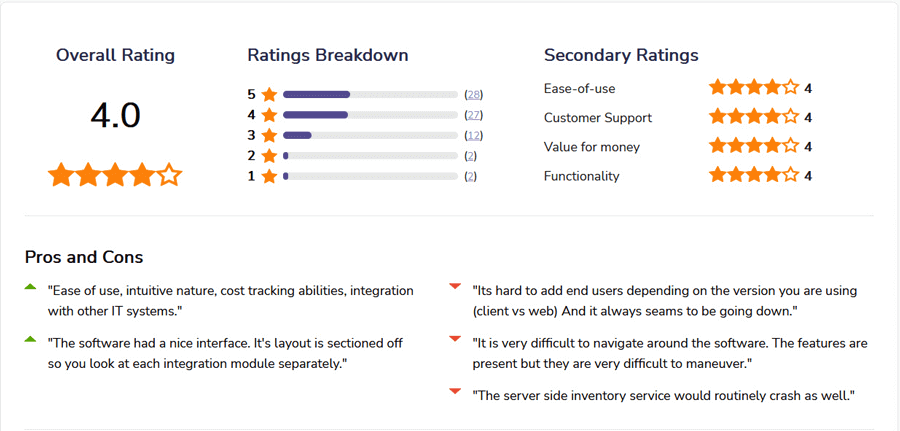
Independent Ratings and Reviews for BMC Track-It! from Software Advice
Kaseya VSA
Kaseya VSA emerges as a formidable help desk and IT management solution, combining Remote Monitoring and Management (RMM) capabilities with a wide range of tools designed to streamline IT operations. Its strengths in automation, security, and scalability are notable. However, potential adopters should weigh these advantages against challenges such as a steep learning curve, integration limitations, and inconsistent support quality to ensure it aligns with their organizational needs. Also, there have been recent cybersecurity breaches and vulnerabilities reported by the United States government.
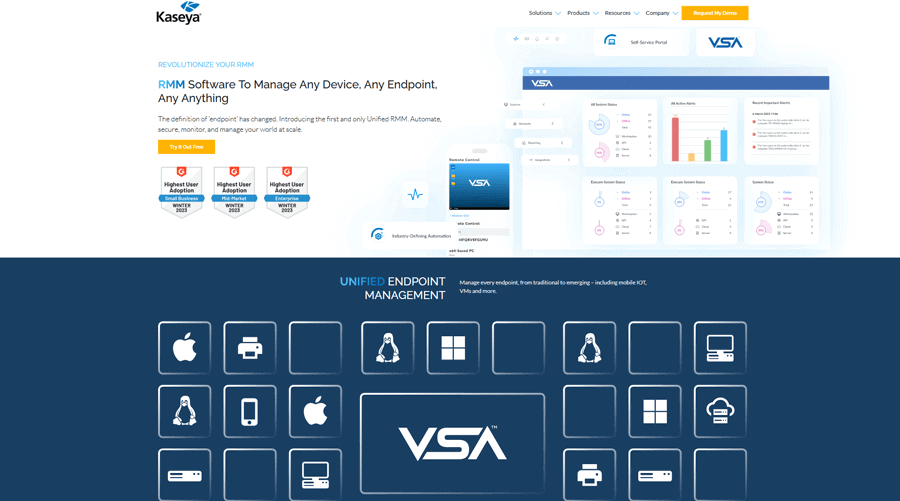
Kaseya VSA Pros
- Unified Remote Monitoring: Kaseya VSA stands out with its integrated RMM capabilities, allowing IT teams to seamlessly oversee and manage multiple devices and networks from a centralized location.
- Automation Capabilities: The software provides robust automation tools, ensuring that routine tasks and maintenance operations are executed efficiently without manual intervention.
- Intuitive Dashboard: Kaseya VSA offers a user-friendly interface that provides a clear overview of the IT environment, enabling technicians to identify and resolve issues promptly.
- Comprehensive Reporting: For organizations that prioritize data-driven decision-making, VSA's detailed reporting tools are a major asset, offering insights into performance metrics, ticketing trends, and more.
- Integrated Security Features: With increasing cyber threats, the built-in security functionalities of Kaseya VSA — including patch management and antivirus solutions — are valuable for protecting IT environments.
- Scalability: As organizations grow, Kaseya VSA can scale to meet increasing demands, making it a viable choice for both small businesses and large enterprises.
Kaseya VSA Cons
- Steep Learning Curve: The extensive feature set can be overwhelming for new users, often necessitating comprehensive training and professional services to fully harness its capabilities.
- Pricing Model: Some businesses find the pricing structure high, particularly when additional modules or functionalities are needed.
- Integration Limitations: While Kaseya VSA supports numerous integrations, it can encounter compatibility issues with specific third-party tools, which may hinder workflow efficiency.
- Occasional Glitches: Users have reported software performance slowdowns and intermittent bugs that can affect service delivery speed.
- Interface Updates: The platform undergoes frequent updates, and some long-term users find the continual interface changes disruptive.
- Customer Support: Although technical support is available, response times and resolution effectiveness have been recurring concerns among many customers.
Other Kaseya VSA Company and Location Information
- Company Ownership: Start-up and venture capital funded. Kaseya has acquired 13 companies since its founding and is reportedly seeking an exit through a private equity buyout.
- Headquarters: USA
- R&D: Majority based in India
- Technical Support: Majority outside of USA
Pricing, Videos, Trial and Reviews Information for Kaseya VSA
- Pricing not available. Must speak with a partner reseller or sales person.
- Features & Demo Videos
- Trial account not available from website.
- Independent Customer Reviews
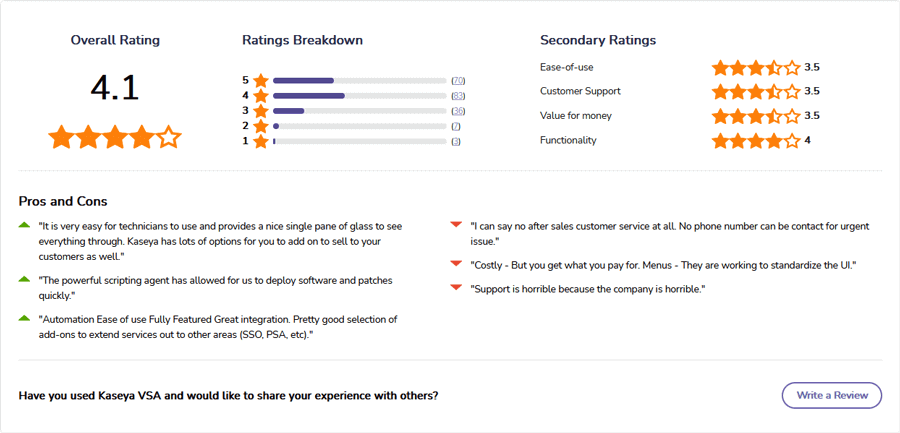
Independent Ratings and Reviews for Kaseya VSA from Software Advice
Spiceworks Cloud Help Desk
Spiceworks Cloud Help Desk remains a popular choice for small to medium-sized businesses, primarily due to its cost-effectiveness and active community-driven support ecosystem. Its user-friendly design, combined with essential IT management tools, makes it an appealing option for budget-conscious organizations. However, potential customers should balance these advantages against concerns around scalability, data privacy, and performance consistency.
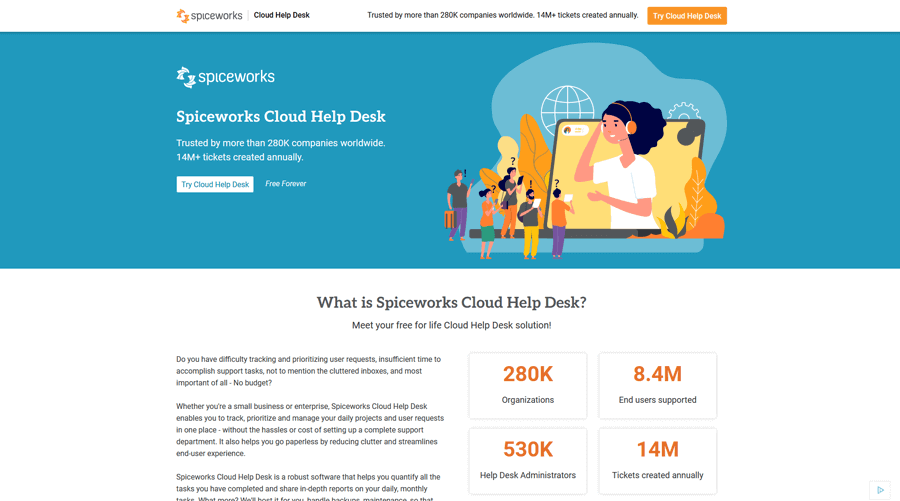
Spiceworks Cloud Help Desk Pros
- Free Tier Available: One of Spiceworks' strongest advantages is cost-effectiveness. The platform offers a robust free version that meets the needs of many small and medium-sized businesses.
- Community Integration: Spiceworks is not just software—it's also a thriving community. Users can tap into a large network of IT professionals for advice, reviews, and troubleshooting insights.
- Cloud and On-Premises Options: The platform provides flexibility with both cloud-based and on-premises deployment models, catering to diverse infrastructure preferences.
- User-Friendly Interface: The software features an intuitive dashboard and streamlined UI, simplifying ticketing and helping new users acclimate quickly.
- Inventory Management: Beyond ticketing, Spiceworks includes built-in IT asset management, providing visibility into devices, software, and other network assets.
- Customizable: The platform supports various plugins and integrations, enabling teams to tailor the system to their specific operational needs.
Spiceworks Cloud Help Desk Cons
- Performance Issues: Users have reported slow performance and periodic crashes, especially during large network scans or when managing extensive asset inventories.
- Ad-Supported Model: The free version is ad-supported, which some users find intrusive or distracting in professional settings.
- Limited Advanced Features: While effective for basic IT help desk functions, Spiceworks lacks many of the advanced capabilities found in enterprise-grade solutions.
- Scalability Concerns: As IT environments grow more complex, larger organizations may find the platform less capable of handling higher volumes of data or tickets.
- Support Limitations: Although the community is active, formal technical support for the free version can be limited and slow to respond.
- Data Privacy: Due to its ad-supported structure, there are concerns about data privacy and the potential use of user data for advertising purposes.
Other Spiceworks Cloud Help Desk Company and Location Information
- Company Ownership: Private company, acquired by Ziff Davis Enterprises in August 2019.
- Headquarters: USA
- R&D and Technical Support: India
Pricing, Videos, Trial and Reviews Information for Spiceworks Cloud Help Desk
- Pricing: Product is free
- Features & Demo Videos
- Create Trial Account
- Independent Customer Reviews
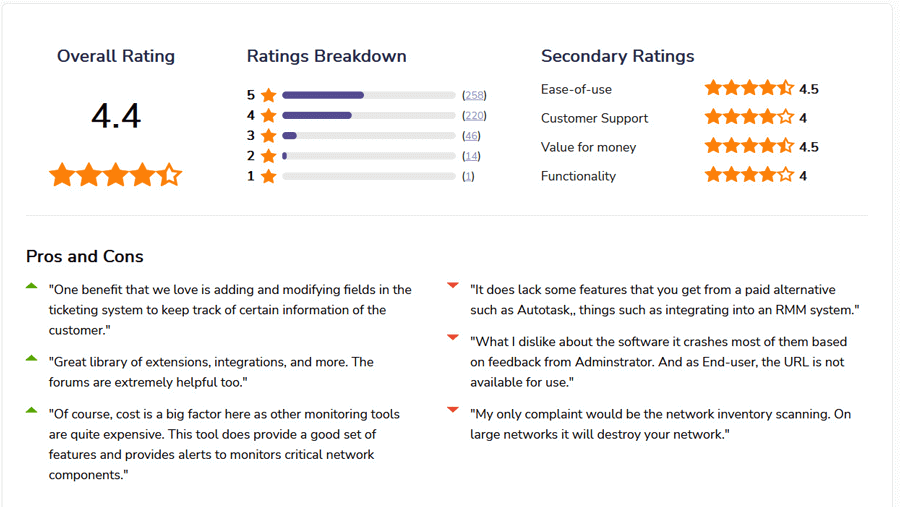
Independent Ratings and Reviews for Spiceworks Cloud Help Desk from Software Advice
InvGate Service Management
InvGate Service Management is a robust ITSM/ESM platform offering a modern set of capabilities aimed at enhancing user experience, automating workflows, and supporting cross-departmental service delivery. It is particularly strong in UI design, gamification, built-in intelligence, and rapid deployment. However, organizations should consider its scalability ceiling, integration breadth, and relative maturity in high-scale environments.
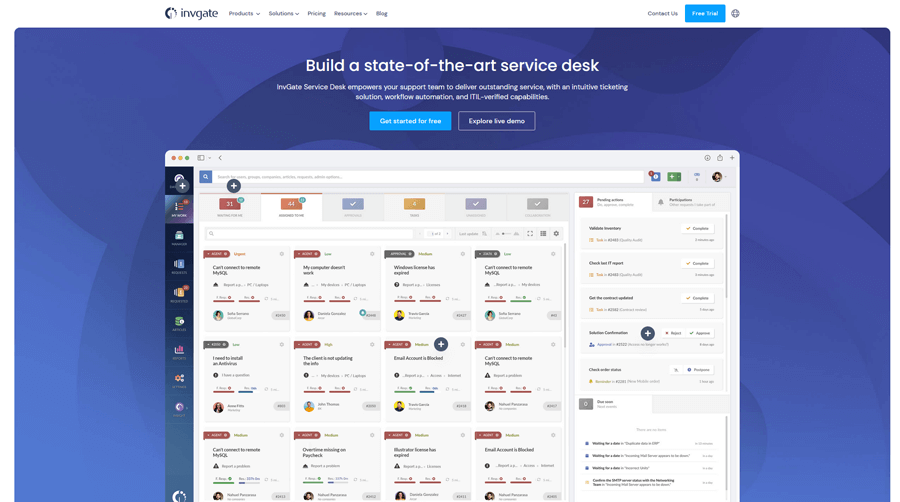
InvGate Service Management Pros
- Intuitive Interface & Rapid Deployment: The platform's modern card-based UI, drag-and-drop workflow editor, and configuration tools enable easier adoption and faster onboarding.
- Strong AI & Automation Features: InvGate's AI Hub adds smart suggestions, draft response enhancements, automatic knowledge article generation, ticket summarization, predictive ticketing, and virtual agent capabilities.
- Built-in ESM / Cross-Department Use: InvGate is positioned not just as an IT tool but as a service management backbone across HR, Facilities, Legal, and more — many customers already use its ESM extensions.
- Good Native Integrations: It supports integrations with common platforms (Microsoft Entra ID, Google Workspace, Jira, Slack, SCCM) for synchronization and workflow triggers.
- Gamification & Agent Motivation: The platform includes features to gamify performance, driving agent engagement and metrics-based competition.
- Unified Asset / Ticket Insight: Because InvGate also offers Asset Management (formerly InvGate Insight), linking assets and tickets is more seamless, enabling better contextual incident resolution.
InvGate Service Management Cons
- Scalability Concerns: For very large enterprises, the performance and scaling limits (in high concurrency, massive ticket volumes, or multi-regional deployments) may become apparent.
- Integration Gaps: While standard integrations are solid, integration with niche or legacy systems may require custom development or be less mature.
- Reporting Depth: Users sometimes report that although reporting is functional and includes many metrics, finer-grained or highly customized analytics may be less robust compared to top-tier competitors.
- Pricing / Licensing Model: Some organizations find the tiered pricing (Starter, Pro, Enterprise) less flexible or feel cost jumps are steep.
- Training Needs for Advanced Use: While basic use is intuitive, leveraging advanced AI, workflow customizations, or cross-department modules may require training or professional services.
- Mobile Feature Parity: The mobile interface exists, but it may lack full parity with desktop capabilities for more complex workflows or admin settings.
- Maturity / Market Penetration in Some Regions: In some markets, InvGate may be less established or have fewer local support resources.
Other InvGate Service Management Company and Location Information
- Company Ownership: Start-up & venture capital funded. Private foreign company.
- Headquarters: Buenos Aires, Argentina
- R&D and Technical Support: Buenos Aires, Argentina
Pricing, Videos, Trial and Reviews Information for InvGate Service Management
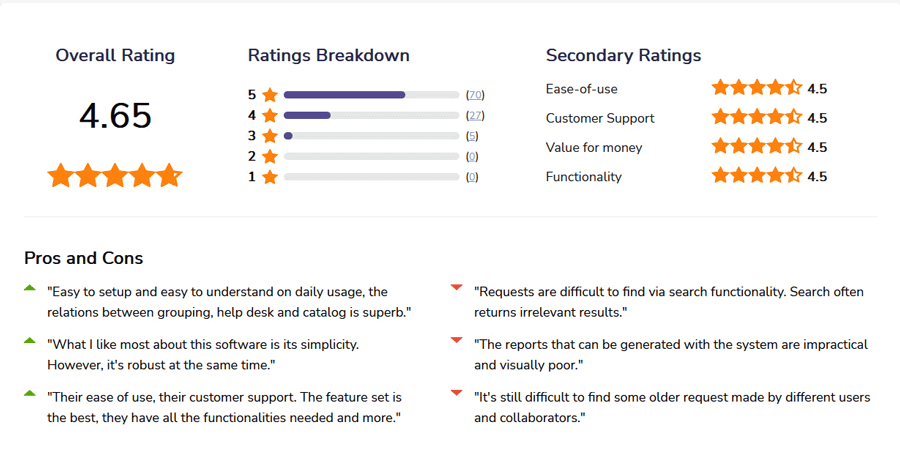
Independent Ratings and Reviews for InvGate Service Management from Software Advice
Atera Networks Ltd.
Atera Networks Ltd. offers an integrated IT management platform that combines ease of use with a straightforward pricing model. While the product continues to evolve (especially around AI and automation), there remain areas—such as advanced patching, deep analytics, and mobile parity—that prospective buyers should scrutinize.
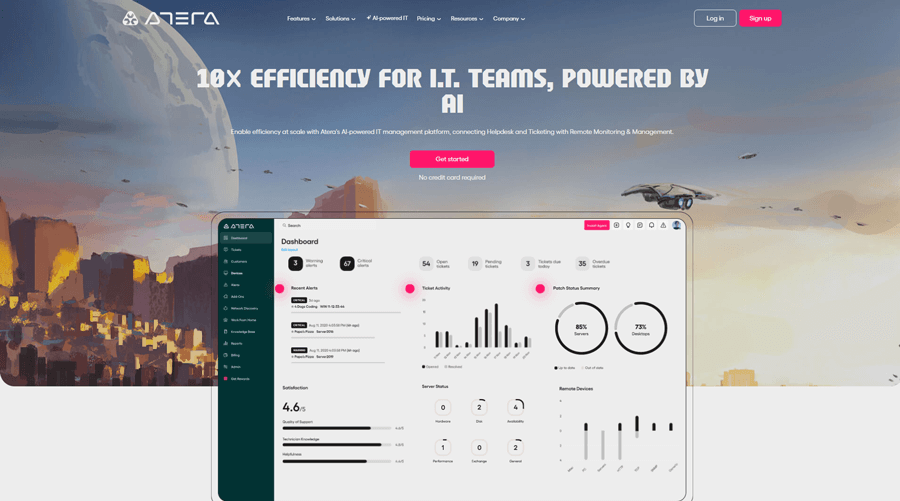
Atera Networks Ltd. Pros
- All-in-One Platform: Atera combines RMM, PSA, remote access, scripting, and ticketing in a single unified console, reducing tool fragmentation.
- Transparent Pricing: It uses a per-technician model rather than per-endpoint, allowing unlimited devices under each technician license.
- Intuitive Interface & Onboarding: The dashboard and workflow setup are frequently lauded for being easy to use, with relatively fast ramp-up for basic operations.
- AI & Automation Enhancements: Newer features branded as "Autonomous IT," AI Copilot, and automated scripting help offload routine tasks and assist with proactive issue resolution.
- Cloud Native / Accessibility: Being fully cloud-based (hosted on Microsoft Azure) ensures remote access, real-time updates, and broad availability.
- Scalability for SMBs / MSPs: Many user reviews and comparisons place Atera among top choices for growing MSPs or small IT teams scaling operations.
- Strong Ecosystem for Monitoring & Asset Management: The platform supports device discovery, asset tracking, scripting, alerts, and linkages between ticketing and hardware context.
Atera Networks Ltd. Cons
- Advanced Feature Gaps: Some users note that in-depth capabilities (especially around third-party patching, advanced monitoring like SNMP complexity, or deep integrations) are weaker or require workarounds.
- Reporting & Analytics Limitations: The reporting module is functional but many users request stronger customization, clearer visuals, or more in-depth metrics.
- Patch Management Complaints: While OS patches are generally supported, support for third-party apps is sometimes lacking or comes with caveats per user feedback.
- Mobile App Parity Issues: The mobile app is available but may not reflect full feature parity with the desktop interface, especially for administrative tasks.
- Support & Response Concerns: Some reviews express frustration with slower responses when dealing with complex or nonstandard issues.
- Cost at Scale / Price Jumping: While the pricing model is clear, as more features or modules are needed (AI, advanced analytics), costs escalate quickly.
- Performance / Load Delays: Occasional slow load times or responsiveness lag, especially in large setups or during heavy use, have been reported.
Other Atera Networks Ltd. Company and Location Information
- Company Ownership: Private company.
- Headquarters: Tel Aviv, Israel
- R&D and Technical Support: Majority based in Israel
Pricing, Videos, Trial and Reviews Information for Atera Networks Ltd.
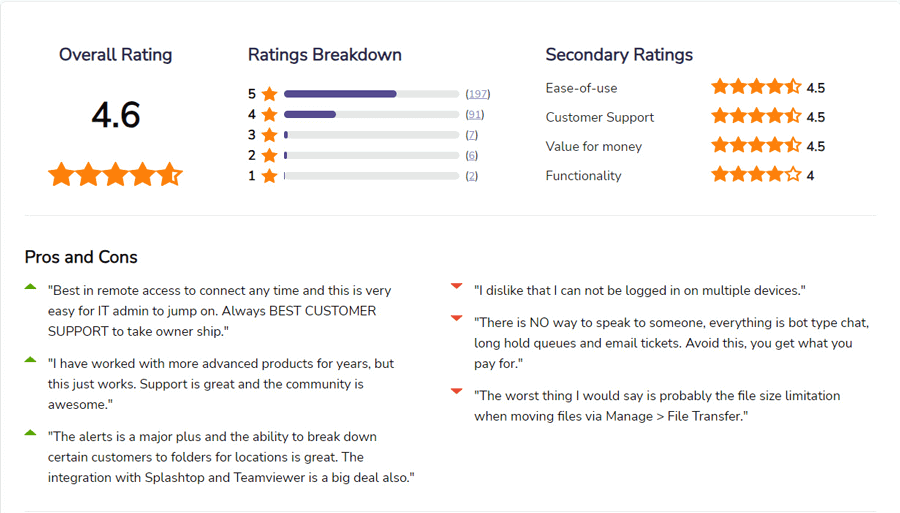
Independent Ratings and Reviews for Atera Networks Ltd. from Software Advice
Naverisk
Naverisk is an integrated RMM and PSA platform designed primarily for Managed Service Providers (MSPs) and internal IT teams that want an all-in-one IT management solution. It combines automation, monitoring, and service management in a single interface, but it still trails leading competitors in certain advanced capabilities and user-experience refinements.
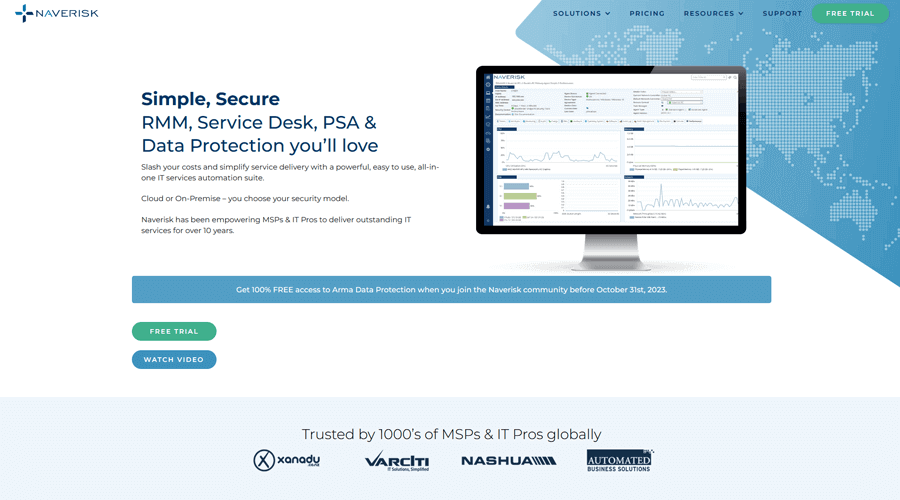
Naverisk Pros
- Unified IT Management: Naverisk merges Remote Monitoring and Management (RMM) and Professional Services Automation (PSA) into one cohesive system, simplifying toolsets for IT teams.
- Device and Platform Coverage: Supports monitoring across servers, workstations, and mobile devices for a complete IT environment overview.
- Automation and Scripting Tools: Enables technicians to automate repetitive workflows and deploy custom scripts, reducing manual intervention.
- Cloud-Native Accessibility: Cloud architecture allows for remote access, scalability, and continuous updates without complex on-premises maintenance.
- Comprehensive Reporting: Offers visual analytics and detailed reports to help identify issues, track performance, and support data-driven decision-making.
Naverisk Cons
- Limited Integrations: Integration with certain third-party applications may require manual setup or additional connectors.
- User Interface Aging: Users have reported that the interface feels dated compared to newer competitors and could benefit from design modernization.
- Performance Stability: Occasional slowdowns and lag can impact daily operations during peak system activity.
- Mobile App Gaps: The mobile experience remains inconsistent with desktop functionality, limiting remote management efficiency.
- Feature Depth: While capable, Naverisk lacks some of the advanced automation, AI, and patch-management features seen in top-tier RMM tools.
- Alert Noise: Notification settings can produce excessive alerts, requiring customization to reduce unnecessary noise.
Other Naverisk Company and Location Information
- Company Ownership: In 2017, the private equity firm Apax Partners acquired Naverisk. The objectives of private equity financial transactions are to cut costs, increase profitability and sell Naverisk to generate a profit for its private investors.
- Headquarters: New Zealand
- R&D and Technical Support: Majority based in New Zealand
Pricing, Videos, Trial and Reviews Information for Naverisk
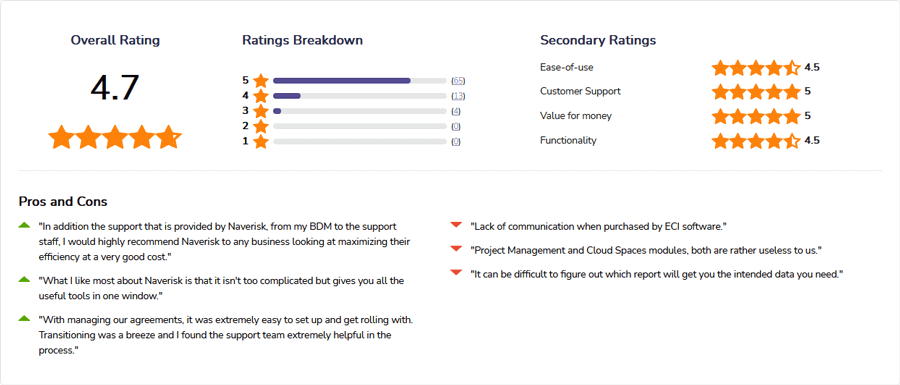
Independent Ratings and Reviews for Naverisk from Software Advice
Kayako One Helpdesk
Kayako One Helpdesk is a cloud-based customer support and IT help desk platform designed to unify conversations across multiple channels. Known for its simple deployment and unified customer view, it suits small to mid-sized teams seeking streamlined multichannel ticketing. However, the platform has lost some market momentum in recent years under ESW Capital's ownership, and support quality has become inconsistent.
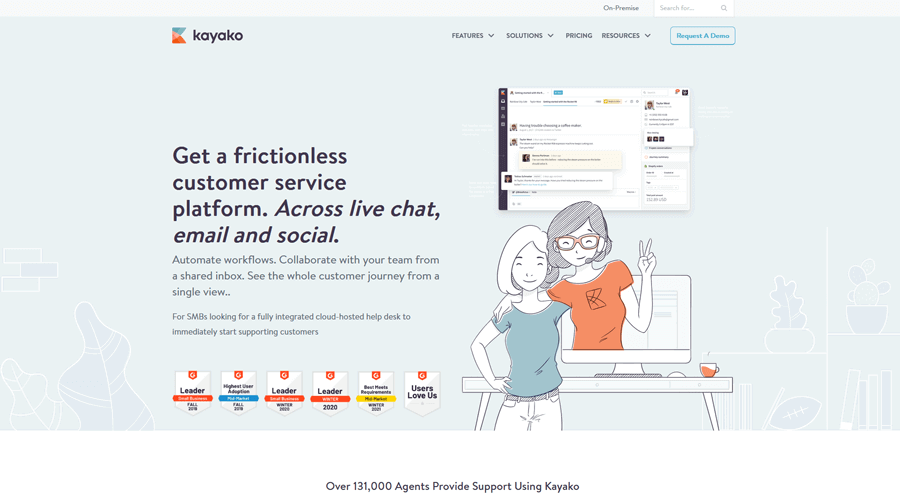
Kayako Pros
- Unified Customer View: Brings all interactions—email, live chat, social, and web—into a single thread, giving agents full visibility into each customer's history.
- Multichannel Ticketing: Enables teams to manage conversations across several channels without switching tools.
- Customizable Knowledge Base: Built-in self-service portal reduces ticket volume and enhances customer independence.
- Collaboration Tools: Internal notes, collision detection, and shared visibility features foster teamwork among support agents.
- Analytics and Reporting: Offers metrics for agent performance, response times, and customer satisfaction to guide improvements.
- Ease of Setup: Cloud deployment and intuitive setup appeal to smaller teams with limited IT overhead.
Kayako Cons
- Limited Development Pace: Since its acquisition by ESW Capital, product innovation and feature updates have slowed.
- Customer Support Issues: Many users report delayed or unresponsive support experiences, especially for technical issues.
- Interface Aging: The user interface feels dated compared to newer cloud help desk platforms.
- Bugs and Reliability: Persistent stability issues and occasional downtime have been cited in user reviews.
- Mobile App Gaps: The mobile version lacks several capabilities available in the web interface.
- Customization Limits: Fewer configuration options than competitors like Zendesk or Freshdesk, constraining flexibility.
Other Kayako Company and Location Information
- Company Ownership: Acquired by ESW Capital in 2018. ESW's operational model emphasizes cost optimization and profitability rather than active R&D investment.
- Headquarters: United Kingdom
- R&D and Technical Support: India & Singapore
Pricing, Videos, Trial and Reviews Information for Kayako
- Pricing
- Features & Demo Videos
- Trial account not available from website
- Independent Customer Reviews
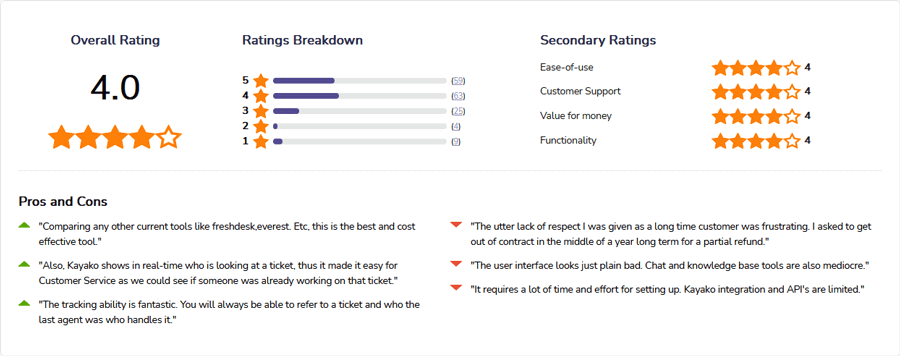
Independent Ratings and Reviews for Kayako from Software Advice
Mint Service Desk
Mint Service Desk is a help desk platform developed in Poland, offering an affordable yet capable solution for ticketing, asset management, and workflow automation. Its focus on configurability and open-source deployment options appeals to organizations that value flexibility, though usability and performance issues still limit its adoption among larger enterprises.
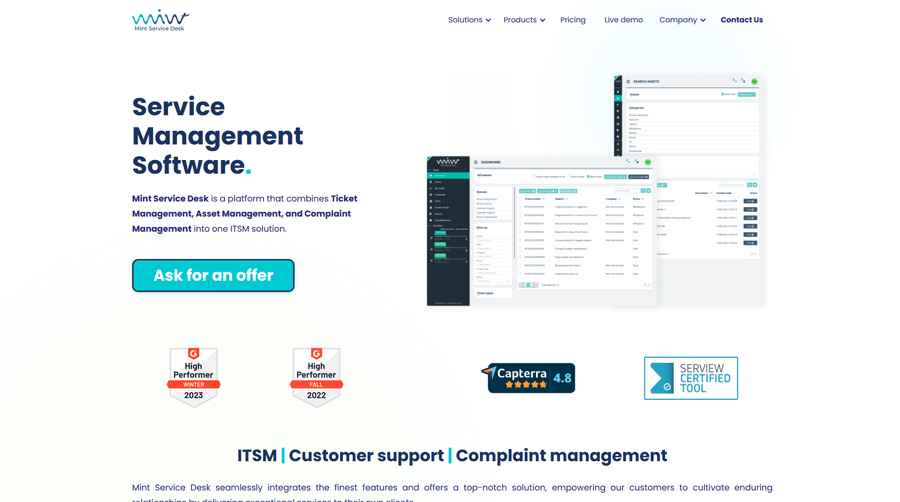
Mint Service Desk Pros
- Integrated Asset Management: Combines service desk and IT asset management functions in one system, allowing for unified tracking of incidents, requests, and hardware/software assets.
- Customizable Ticketing: Provides adaptable workflows, categories, and automation rules suited for organizations with specific support structures.
- Cloud or On-Premises Deployment: Available both as a SaaS offering and an on-premises installation, appealing to security-conscious IT environments.
- Modern API and Extensibility: Supports REST API for custom integrations and automation scripts, giving IT teams more control over system interoperability.
- Affordable Licensing: Positioned as a cost-effective alternative to major ITSM suites, making it attractive for SMBs and budget-limited public sector organizations.
- Active Product Updates: Frequent minor updates continue to refine the UI and expand automation features, reflecting steady product maintenance.
Mint Service Desk Cons
- Integration Gaps: Native third-party integrations remain limited, often requiring manual configuration or API customization.
- Complex Setup: The flexible architecture comes at the cost of a steeper learning curve for administrators and agents.
- Performance Issues: Users report occasional lag and slow page loads, particularly in cloud instances with large data volumes.
- Reporting Depth: While functional, reporting options lack the advanced analytics and visual dashboards found in top-tier competitors.
- UI/UX Improvements Needed: The interface feels somewhat dated and inconsistent across modules.
- Support Responsiveness: Technical support quality and speed remain inconsistent across regions and service tiers.
Other Mint Service Desk Company and Location Information
- Company Ownership: Privately held, venture-funded startup.
- Headquarters: Poland
- R&D and Technical Support: Poland
Pricing, Videos, Trial and Reviews Information for Mint Service Desk
- Pricing
- Features & Demo Videos
- Create Trial Account (from Pricing page)
- Independent Customer Reviews

Independent Ratings and Reviews for Mint Service Desk from Software Advice
Vision Helpdesk
Vision Helpdesk is an India-based IT help desk and service management platform known for its flexible deployment models and multi-brand support capabilities. The software caters to businesses of varying sizes with modules for help desk ticketing, ITIL/ITSM workflows, and customer support. While it offers strong automation and value for money, usability and reliability issues remain ongoing concerns.
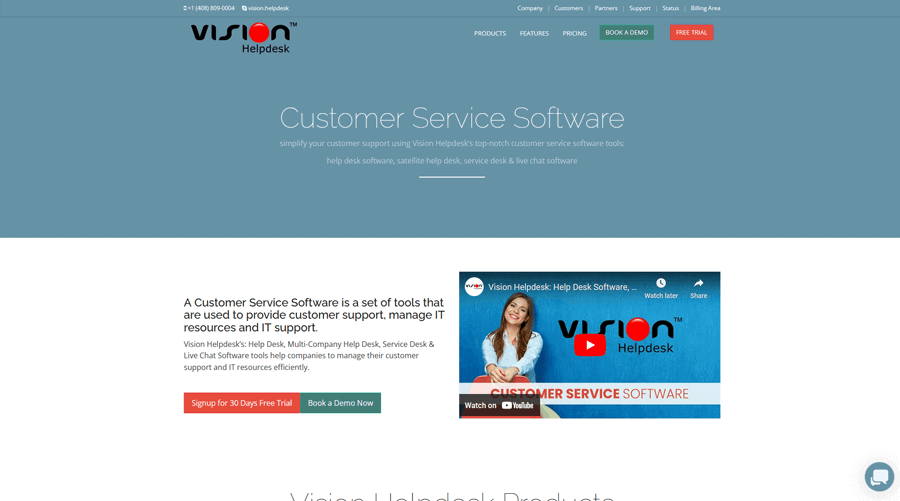
Vision Helpdesk Pros
- Blended Ticketing System: Combines tickets from multiple sources—email, chat, social, voice—into a single, unified queue, simplifying agent workload.
- Satellite Help Desk: Enables multi-brand or multi-department organizations to manage several help desks from one central console while maintaining brand separation for customers.
- ITIL-Aligned Modules: Includes incident, problem, change, and asset management components that align with ITIL standards, appealing to IT-focused teams.
- Automation and SLA Tools: Offers customizable automation workflows, SLA tracking, and escalation rules to maintain service consistency and timely responses.
- Deployment Flexibility: Available as both a cloud-hosted and on-premises solution, giving organizations control over data residency and compliance.
- Affordable Pricing: Positioned competitively against larger ITSM players, making it attractive for mid-market and regional MSPs.
Vision Helpdesk Cons
- Learning Curve: The breadth of features can make onboarding complex, especially for small teams without prior ITSM experience.
- Outdated Interface: UI design and navigation lag behind modern cloud-native help desk tools, impacting usability.
- Mobile App Limitations: The mobile experience lacks feature parity with the web interface and can be unstable.
- Integration Limitations: Third-party integrations are available but require additional configuration and sometimes custom development.
- Reporting and Customization Gaps: Analytics capabilities are functional but limited in visualization and flexibility.
- Performance and Bug Reports: Some users cite instability and inconsistent performance, particularly after product updates.
Other Vision Helpdesk Company and Location Information
- Company Ownership: Privately held, venture-funded startup.
- Headquarters: India
- R&D and Technical Support: India
Pricing, Videos, Trial and Reviews Information for Vision Helpdesk
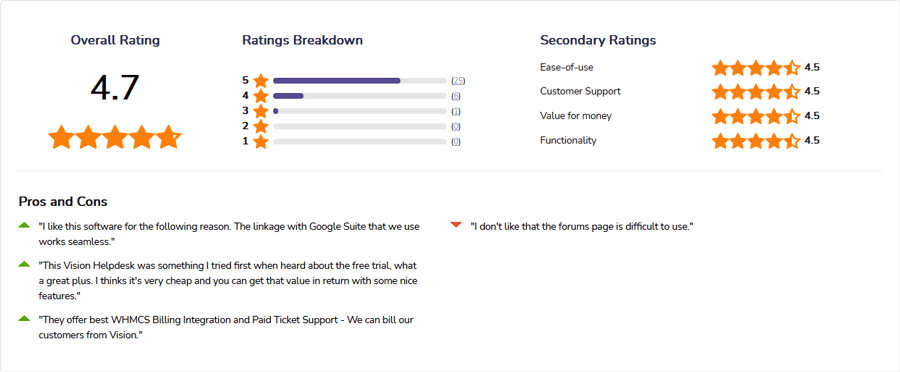
Independent Ratings and Reviews for Vision Helpdesk from Software Advice
NinjaOne Enterprise IT Helpdesk
NinjaOneis a cloud-based IT help desk platform built for IT teams and Managed Service Providers (MSPs). It unifies ticketing, automation, and endpoint management in a single, easy-to-use interface to simplify IT operations and speed up issue resolution. Designed for agility and scalability, it delivers the essential tools most IT departments and MSPs need—without the complexity of full ITSM suites.
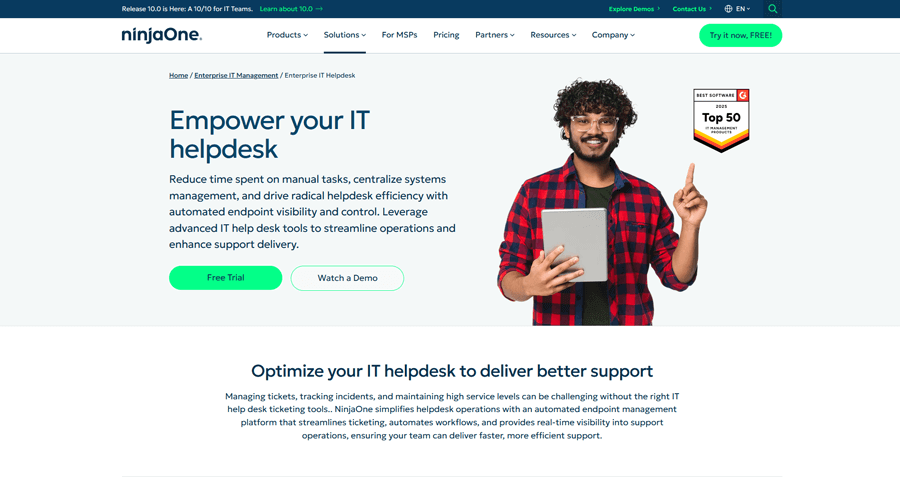
NinjaOne Enterprise IT Helpdesk Pros
- Unified IT Operations: Combines ticketing, endpoint monitoring, and patch automation in one interface, reducing the need for multiple tools.
- Fast, Intuitive Interface: Streamlined navigation and clean layouts help agents resolve issues quickly with minimal training.
- Automation-Driven Efficiency: Automates repetitive IT tasks such as patching, software deployment, and alert resolution directly within the help desk.
- Real-Time Device Visibility: Offers complete endpoint insight and remote control, improving first-contact resolution rates.
- Quick Deployment: 100% cloud-based setup allows organizations to go live within hours.
- MSP-Friendly Multi-Tenancy: Designed for service providers managing multiple clients with strict isolation and security controls.
- Highly Rated Support: Known for responsive, U.S.-based customer service with strong user satisfaction scores.
NinjaOne Enterprise IT Helpdesk Cons
- Focused Scope: A streamlined help desk tool — ideal for SMBs and MSPs but not intended for enterprise-level ITSM complexity.
- Reporting Limitations: Advanced analytics and fully custom dashboards are still evolving.
- No On-Premises Version: Entirely SaaS-based, which may not align with organizations requiring internal hosting.
- Pricing Transparency: Public pricing is limited; quotes are obtained directly through NinjaOne's sales team.
- Smaller Integration Ecosystem: Fewer third-party integrations compared to large enterprise vendors like ServiceNow or Freshservice.
Other NinjaOne Enterprise IT Helpdesk Company and Location Information
- Company Ownership: Privately held. Founded in 2013 as NinjaRMM; rebranded to NinjaOne in 2021 to reflect a broader IT operations platform.
- Headquarters: Austin, Texas, USA
- R&D: US and Western Europe, with additional teams in India
- Technical Support: North America and EMEA
Pricing, Videos, Trial and Reviews Information for NinjaOne Enterprise IT Helpdesk
- Direct sales quotes
- Features & Demo Videos
- Create Trial Account
- Independent Customer Reviews
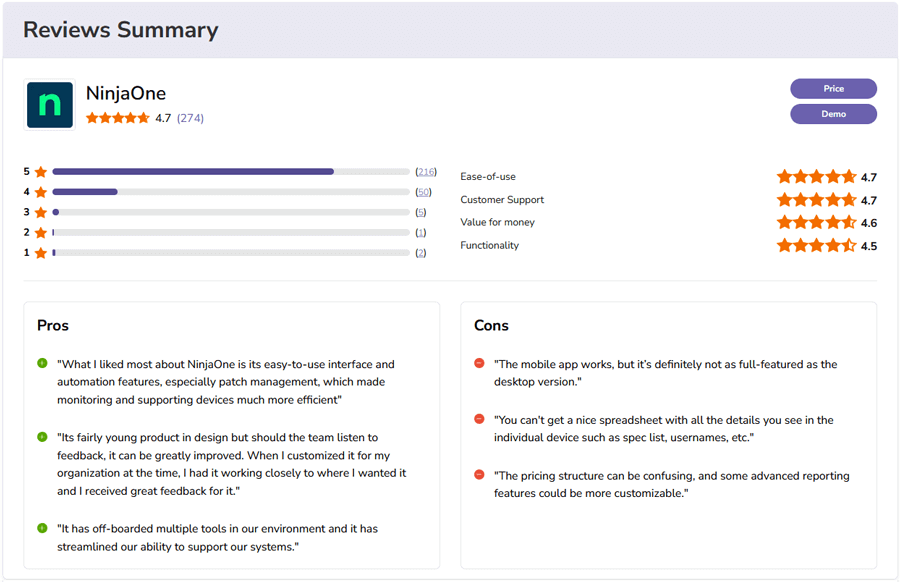
Independent Ratings and Reviews for NinjaOne Enterprise IT Helpdesk from Software Advice
SuperOps
SuperOps is a modern, cloud-native IT help desk and PSA platform built for Managed Service Providers (MSPs) and internal IT teams. It unifies ticketing, project management, RMM, and automation within a single AI-enhanced interface. Designed for speed, simplicity, and scalability, it helps service teams manage operations efficiently with fewer tools and less complexity.
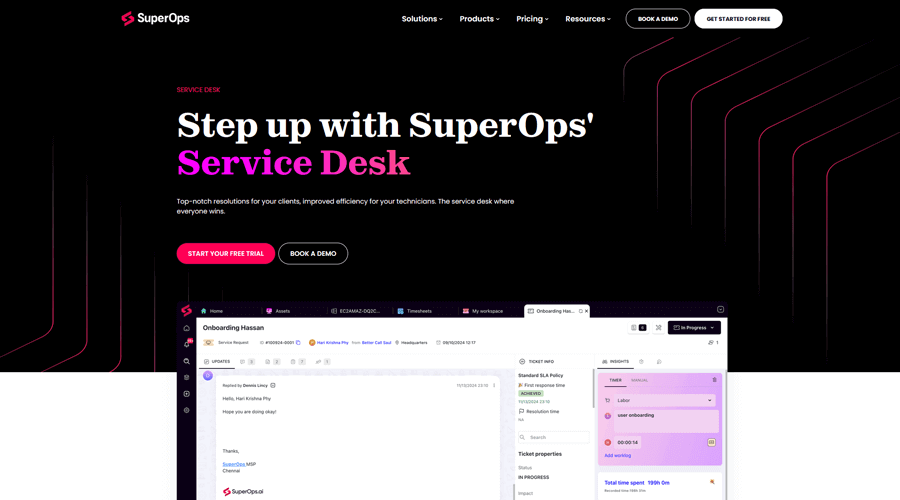
SuperOps Pros
- Unified Platform: Combines help desk, PSA, and RMM functions for complete IT service delivery in one platform.
- Modern, Intuitive Design: A clean, fast interface reduces clutter and helps technicians resolve tickets quickly.
- AI-Driven Automation: Uses AI to categorize, prioritize, and route tickets automatically, improving efficiency.
- Strong PSA Capabilities: Built-in time tracking, billing, contracts, and project management for MSPs.
- Fast Deployment: Fully SaaS-based setup allows rapid onboarding without on-prem infrastructure.
- Active Product Development: Frequent updates and feature rollouts based on customer feedback.
- Responsive Support: Praised for quick, friendly customer support and onboarding assistance.
SuperOps Cons
- Growing Ecosystem: Integration options are expanding but not as extensive as older PSA platforms.
- Limited Enterprise Features: Best suited for MSPs and SMBs rather than large enterprises needing deep ITSM modules.
- Reporting Maturity: Custom dashboards and advanced analytics are still evolving.
- No On-Prem Option: Cloud-only platform, which may not meet on-prem security or data residency requirements.
- Smaller Market Share: Newer entrant compared to long-established PSA and help desk providers.
Other SuperOps Company and Location Information
- Company Ownership: Privately held; founded in 2020 by former Zoho executives.
- Headquarters: Chennai, India
- R&D: Primarily in India
- Technical Support: Global support coverage
Pricing, Videos, Trial and Reviews Information for SuperOps
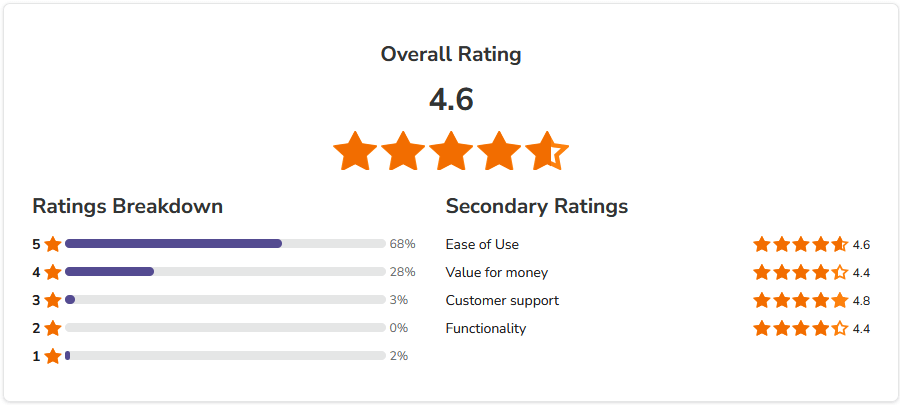
Independent Ratings and Reviews for SuperOps from Software Advice
What Is IT Help Desk Software?
IT help desk software is a centralized platform that helps organizations manage, track, and resolve internal IT support requests. It gives IT teams a single place to receive issues, assign tickets, automate workflows, and monitor service performance across the organization.
Unlike general customer support software, IT help desk software is designed specifically for internal technical support. It focuses on issues such as hardware and software problems, system access requests, network outages, security incidents, and application errors.
Modern IT help desk software typically includes ticketing, automation, self-service portals, knowledge bases, reporting dashboards, and integrations with identity management, monitoring, and collaboration tools. For regulated industries like healthcare, security features such as audit trails, access controls, and HIPAA-compliance support are especially important.
The Top 15 Must-Have Features of IT Help Desk Software
IT Help Desk software plays a crucial role in streamlining IT operations and ensuring prompt and effective resolution of issues. Here are the top 15 must-have features for such software:
- Ticket Management: Allows users to create, update, and track the status of incidents or service requests.
- Automation and Workflow Tools: Automates repetitive tasks and directs tickets based on criteria like severity, category, or user group.
- Knowledge Base: A centralized repository of solutions to common issues, aiding in quicker problem resolution and facilitating self-service.
- SLA Management: Ensures that IT services are delivered within agreed-upon timeframes, helping prioritize and escalate tickets based on predefined service level agreements.
- Multi-Channel Support: Allows users to raise tickets via various channels such as email, chat, phone, and even social media.
- User Portal: A self-service portal where end-users can log issues, track ticket progress, and access the knowledge base.
- Asset Management: Tracks and manages all IT assets, ensuring software compliance and aiding in lifecycle management.
- Reporting and Analytics: Provides insights into help desk performance, ticket trends, technician productivity, and customer satisfaction.
- Remote Support Integration: Enables technicians to remotely access and control a user's device for quicker issue resolution.
- Mobile Access: A mobile app or mobile-responsive design ensures IT staff can address issues from anywhere.
- Customization and Configurability: Allows the software to be tailored based on an organization's unique processes and needs.
- Collaboration Tools: Features like shared notes, chat, or integration with collaboration platforms to aid in internal communication.
- Escalation Mechanisms: Ensures that tickets which aren't resolved at initial levels are escalated appropriately, based on rules and timeframes.
- Security Features: Role-based access control, audit logs, encryption, and compliance mechanisms to safeguard data.
- Integration Capabilities: Ability to integrate with other tools such as CRM, ERP, and monitoring systems, ensuring a seamless IT ecosystem.
How to Choose the Right IT Help Desk Software
Choosing the right IT help desk software depends on your organization's size, technical complexity, compliance needs, and support goals. While features matter, alignment with how your IT team actually works is even more important.
Key factors to consider include:
- Team Size and Support Volume: Smaller IT teams may need simple ticketing and automation, while larger or distributed teams often require advanced routing, role-based access, and SLA management.
- Support Channels: Determine whether your IT team supports requests via email only or also needs portals, chat, phone, or self-service options.
- Automation and Workflow Needs: Look for tools that reduce manual work through ticket routing, prioritization, escalation rules, and automated notifications.
- Reporting and Visibility: Strong reporting helps IT leaders track performance, identify recurring issues, and justify staffing or technology investments.
- Security and Compliance Requirements: Organizations in regulated industries should prioritize encryption, audit logs, role-based permissions, and support for standards such as HIPAA or SOC 2.
- Ease of Use and Deployment: The best IT help desk software balances powerful features with ease of setup, training, and day-to-day use.
IT Help Desk Software by Business Type and Use Case
Different organizations have different IT support needs, and not all IT help desk software is built for the same environments. Below is a general guide to how common business types align with different types of tools:
- Small and Mid-Sized Businesses (SMBs): SMBs typically benefit from IT help desk software that is easy to deploy, affordable, and simple to manage without a dedicated IT operations team. Key priorities often include ease of use, automation, and fast time to value.
- Mid-Market and Growing Organizations: As organizations scale, IT teams often need more structured workflows, better reporting, and stronger integrations. Tools that support SLA management, role-based permissions, and process standardization are usually a better fit.
- Enterprise IT Teams: Large enterprises often require advanced customization, deep integrations, multi-team coordination, and support for complex approval and change management processes. Scalability and governance are critical at this level.
- Healthcare and Regulated Organizations: Organizations handling sensitive data need IT help desk software with strong security controls, audit trails, and compliance support. Ease of use is still important, but regulatory requirements often drive tool selection.
- IT Service Providers and Internal Shared Services: Teams supporting multiple departments or client environments often benefit from flexible ticket categorization, automation, and visibility across service groups.
Schedule a Giva demo now, or start your own free, 30-day trial today.
Get free set-up assistance. At no cost to you, Giva's well-trained product experts will answer questions and make setup/configuration recommendations during the 30-day trial.
Start a Free Trial
Get a Demo
